
lyraios
LYRAI is a Model Context Protocol (MCP) operating system for multi-AI AGENTs designed to extend the functionality of AI applications by enabling them to interact with financial networks and blockchain public chains. The server offers a range of advanced AI assistants, including blockchain public chain operations (SOLANA,ETH,BSC,etc.)
Stars: 202
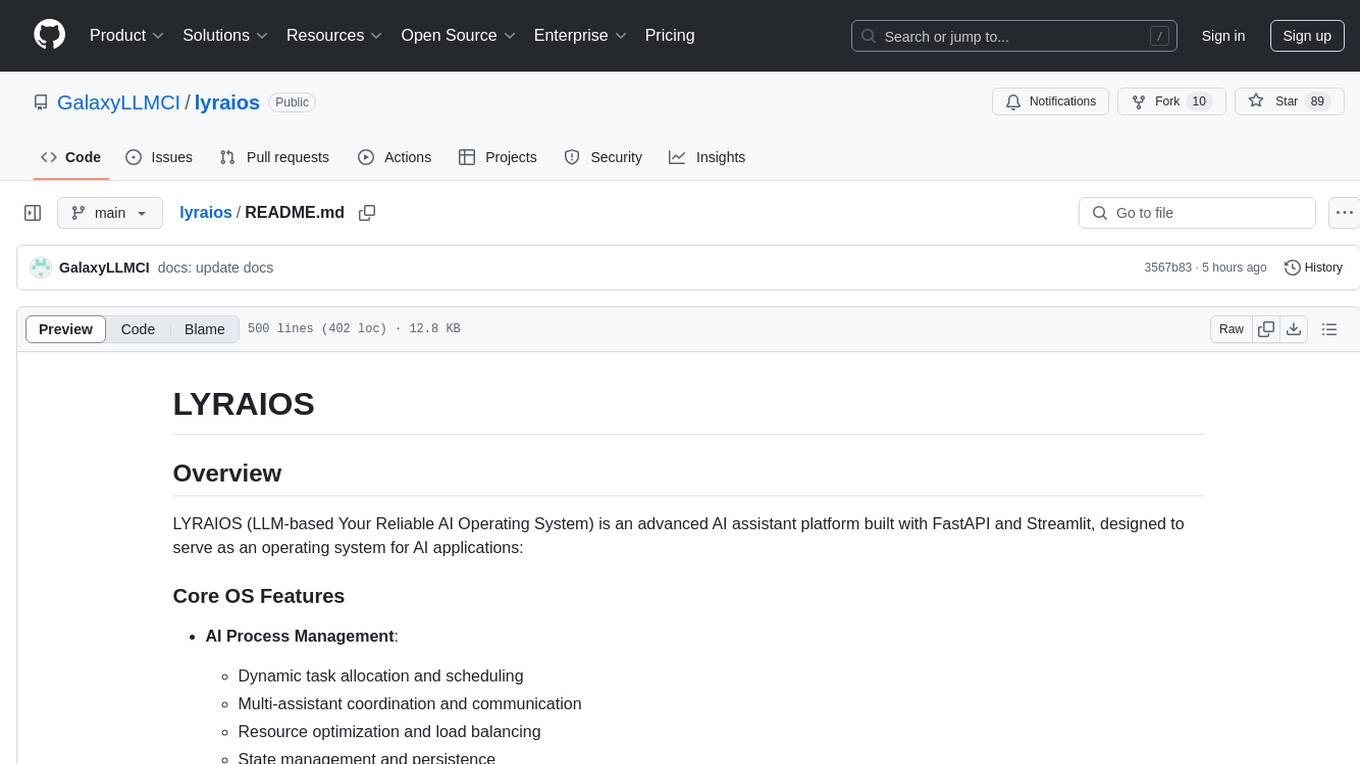
LYRAIOS (LLM-based Your Reliable AI Operating System) is an advanced AI assistant platform built with FastAPI and Streamlit, designed to serve as an operating system for AI applications. It offers core features such as AI process management, memory system, and I/O system. The platform includes built-in tools like Calculator, Web Search, Financial Analysis, File Management, and Research Tools. It also provides specialized assistant teams for Python and research tasks. LYRAIOS is built on a technical architecture comprising FastAPI backend, Streamlit frontend, Vector Database, PostgreSQL storage, and Docker support. It offers features like knowledge management, process control, and security & access control. The roadmap includes enhancements in core platform, AI process management, memory system, tools & integrations, security & access control, open protocol architecture, multi-agent collaboration, and cross-platform support.
README:
LYRAI is a Model Context Protocol (MCP) operating system for multi-AI AGENTs designed to extend the functionality of AI applications (such as Claude Desktop and Cursor) by enabling them to interact with financial networks and blockchain public chains. The server offers a range of advanced AI assistants, including blockchain public chain operations (SOLANA, ETH, etc. - retrieving wallet addresses, listing wallet balances, transferring funds, deploying smart contracts, on-chain lending, calling contract functions, managing tokens), fintech market analysis and summary reports, and learning and training systems for the education sector.
In the future operation of LYRAIOS, advanced VIP features will exclusively support payment using LYRAI on solana, with LYRAI's CA :
A6MTWuHbXqjH3vYEfbs3mzvGThQtk5S12FjmdpVkpump
Welcome to check out the demo of our LYRA MCP-OS!
https://github.com/user-attachments/assets/479cad58-ce4b-4901-93ff-e60a98c477d4
LYRAIOS aims to create the next generation AI Agent operating system with technological breakthroughs in three dimensions:
- Open Protocol Architecture: Pioneering modular integration protocol supporting plug-and-play third-party tools/services, compatible with multi-modal interaction interfaces (API/plugins/smart hardware), with 80%+ improved extensibility compared to traditional frameworks
- Multi-Agent Collaboration Engine: Breaking through single Agent capability boundaries through distributed task orchestration system enabling dynamic multi-agent collaboration, supporting enterprise-grade complex workflow automation and conflict resolution
- Cross-Platform Runtime Environment: Building cross-terminal AI runtime environment, enabling smooth migration from personal intelligent assistants to enterprise digital employees, applicable for validating multi-scenario solutions in finance, healthcare, intelligent manufacturing and other fields
For detailed architecture information, see the Architecture Documentation.
LYRAIOS adopts a layered architecture design, from top to bottom, including the user interface layer, core OS layer, MCP integration layer, and external services layer.
The user interface layer provides multiple interaction modes, allowing users to interact with the AI OS.
- Web UI: Based on Streamlit, providing an intuitive user interface
- Mobile UI: Mobile adaptation interface, supporting mobile device access
- CLI: Command line interface, suitable for developers and advanced users
- API Clients: Provide API interfaces, supporting third-party application integration
The core OS layer implements the basic functions of the AI operating system, including process management, memory system, I/O system, and security control.
-
Process Management
- Task Scheduling: Dynamic allocation and scheduling of AI tasks
- Resource Allocation: Optimize AI resource usage
- State Management: Maintain AI process state
-
Memory System
- Short-term Memory: Session context maintenance
- Long-term Storage: Persistent knowledge storage
- Knowledge Base: Structured knowledge management
-
I/O System
- Multi-modal Input: Handle text, files, APIs, etc.
- Structured Output: Generate formatted output results
- Event Handling: Respond to system events
-
Security & Access Control
- Authentication: User authentication
- Authorization: Permission management
- Rate Limiting: Prevent abuse
MCP Integration Layer is the core innovation of the system, achieving seamless integration with external services through the Model Context Protocol.
-
MCP Client
- Protocol Handler: Process MCP protocol messages
- Connection Management: Manage connections to MCP servers
- Message Routing: Route messages to appropriate processors
-
Tool Registry
- Tool Registration: Register external tools and services
- Capability Discovery: Discover tool capabilities
- Manifest Validation: Validate tool manifests
-
Tool Executor
- Execution Environment: Provide an execution environment for tool execution
- Resource Management: Manage the resources used by tool execution
- Error Handling: Handle errors during tool execution
-
Adapters
- REST API Adapter: Connect to REST API services
- Python Plugin Adapter: Integrate Python plugins
- Custom Adapter: Support other types of integration
The external services layer includes various services integrated through the MCP protocol, which act as MCP servers providing capabilities.
- File System: Provide file read and write capabilities
- Database: Provide data storage and query capabilities
- Web Search: Provide internet search capabilities
- Code Editor: Provide code editing and execution capabilities
- Browser: Provide web browsing and interaction capabilities
- Custom Services: Support other custom services integration
The Tool Integration Protocol is a key component of LYRAIOS's Open Protocol Architecture. It provides a standardized way to integrate third-party tools and services into the LYRAIOS ecosystem.
- Standardized Tool Manifest: Define tools using a JSON schema that describes capabilities, parameters, and requirements
- Pluggable Adapter System: Support for different tool types (REST API, Python plugins, etc.)
- Secure Execution Environment: Tools run in a controlled environment with resource limits and permission checks
- Versioning and Dependency Management: Track tool versions and dependencies
- Monitoring and Logging: Comprehensive logging of tool execution
- Define Tool Manifest: Create a JSON file describing your tool's capabilities
- Implement Tool: Develop the tool functionality according to the protocol
- Register Tool: Use the API to register your tool with LYRAIOS
- Use Tool: Your tool is now available for use by LYRAIOS agents
For examples and detailed documentation, see the Tool Integration Guide.
Model Context Protocol (MCP) is a client-server architecture protocol for connecting LLM applications and integrations. In MCP:
- Hosts are LLM applications (such as Claude Desktop or IDE) that initiate connections
- Clients maintain a 1:1 connection with servers in host applications
- Servers provide context, tools, and prompts to clients
LYRAIOS supports the following MCP functions:
- Resources: Allow attaching local files and data
- Prompts: Support prompt templates
- Tools: Integrate to execute commands and scripts
- Sampling: Support sampling functions (planned)
- Roots: Support root directory functions (planned)
- User sends request through the interface layer
- Core OS layer receives the request and processes it
- If external tool support is needed, the request is forwarded to the MCP integration layer
- MCP client connects to the corresponding MCP server
- External service executes the request and returns the result
- The result is returned to the user through each layer
- AI Agent determines that a specific tool is needed
- Tool registry looks up tool definition and capabilities
- Tool executor prepares execution environment
- Adapter converts request to tool-understandable format
- Tool executes and returns the result
- The result is returned to the AI Agent for processing
LYRAIOS (LLM-based Your Reliable AI Operating System) is an advanced AI assistant platform built with Streamlit, designed to serve as an operating system for AI applications.
-
AI Process Management:
- Dynamic task allocation and scheduling
- Multi-assistant coordination and communication
- Resource optimization and load balancing
- State management and persistence
-
AI Memory System:
- Short-term conversation memory
- Long-term vector database storage
- Cross-session context preservation
- Knowledge base integration
-
AI I/O System:
- Multi-modal input processing (text, files, APIs)
- Structured output formatting
- Stream processing capabilities
- Event-driven architecture
- Calculator: Advanced mathematical operations including factorial and prime number checking
- Web Search: Integrated DuckDuckGo search with customizable result limits
-
Financial Analysis:
- Real-time stock price tracking
- Company information retrieval
- Analyst recommendations
- Financial news aggregation
- File Management: Read, write, and list files in the workspace
- Research Tools: Integration with Exa for comprehensive research capabilities
-
Python Assistant:
- Live Python code execution
- Streamlit charting capabilities
- Package management with pip
-
Research Assistant:
- NYT-style report generation
- Automated web research
- Structured output formatting
- Source citation and reference management
- FastAPI Backend: RESTful API with automatic documentation
- Streamlit Frontend: Interactive web interface
- Vector Database: PGVector for efficient knowledge storage and retrieval
- PostgreSQL Storage: Persistent storage for conversations and assistant states
- Docker Support: Containerized deployment for development and production
-
Knowledge Management:
- PDF document processing
- Website content integration
- Vector-based semantic search
- Knowledge graph construction
-
Process Control:
- Task scheduling and prioritization
- Resource allocation
- Error handling and recovery
- Performance monitoring
-
Security & Access Control:
- API key management
- Authentication and authorization
- Rate limiting and quota management
- Secure data storage
- Use TLS for remote connections
- Verify connection source
- Implement authentication when needed
- Verify all incoming messages
- Clean input
- Check message size limits
- Verify JSON-RPC format
- Implement access control
- Verify resource paths
- Monitor resource usage
- Limit request rate
- Do not leak sensitive information
- Record security-related errors
- Implement appropriate cleanup
- Handle DoS scenarios
- ✅ Basic AI Assistant Framework
- ✅ Streamlit Web Interface
- ✅ FastAPI Backend
- ✅ Database Integration (SQLite/PostgreSQL)
- ✅ OpenAI Integration
- ✅ Docker Containerization
- ✅ Environment Configuration System
- 🔄 Multi-modal Input Processing (Partial)
- 🚧 Advanced Error Handling & Recovery
- 🚧 Performance Monitoring Dashboard
- 📅 Distributed Task Queue
- 📅 Horizontal Scaling Support
- 📅 Custom Plugin Architecture
- ✅ Basic Task Allocation
- ✅ Multi-assistant Team Structure
- ✅ State Management & Persistence
- 🔄 Dynamic Task Scheduling (Partial)
- 🚧 Resource Optimization
- 🚧 Load Balancing
- 📅 Process Visualization
- 📅 Workflow Designer
- 📅 Advanced Process Analytics
- ✅ Short-term Conversation Memory
- ✅ Basic Vector Database Integration
- ✅ Session Context Preservation
- 🔄 Knowledge Base Integration (Partial)
- 🚧 Memory Optimization Algorithms
- 🚧 Cross-session Learning
- 📅 Hierarchical Memory Architecture
- 📅 Forgetting Mechanisms
- 📅 Memory Compression
- ✅ Calculator
- ✅ Web Search (DuckDuckGo)
- ✅ Financial Analysis Tools
- ✅ File Management
- ✅ Research Tools (Exa)
- ✅ PDF Document Processing
- ✅ Website Content Integration
- 🔄 Python Code Execution (Partial)
- 🚧 Advanced Data Visualization
- 🚧 External API Integration Framework
- 📅 Image Generation & Processing
- 📅 Audio Processing
- 📅 Video Analysis
- ✅ Basic API Key Management
- ✅ Simple Authentication
- 🔄 Authorization System (Partial)
- 🚧 Rate Limiting
- 🚧 Quota Management
- 📅 Role-based Access Control
- 📅 Audit Logging
- 📅 Compliance Reporting
- 🔄 Module Interface Standards (Partial)
- 🚧 Third-party Tool Integration Protocol
- 🚧 Service Discovery Mechanism
- 📅 Universal Connector Framework
- 📅 Protocol Validation System
- 📅 Compatibility Layer for Legacy Systems
- ✅ Basic Team Structure
- 🔄 Inter-agent Communication (Partial)
- 🚧 Task Decomposition Engine
- 🚧 Conflict Resolution System
- 📅 Collaborative Planning
- 📅 Emergent Behavior Analysis
- 📅 Agent Specialization Framework
- ✅ Web Interface
- 🔄 API Access (Partial)
- 🚧 Mobile Responsiveness
- 📅 Desktop Application
- 📅 CLI Interface
- 📅 IoT Device Integration
- 📅 Voice Assistant Integration
- ✅ Completed
- 🔄 Partially Implemented
- 🚧 In Development
- 📅 Planned
# Clone the repo
git clone https://github.com/GalaxyLLMCI/lyraios
cd lyraios
# Create + activate a virtual env
python3 -m venv aienv
source aienv/bin/activate
# Install phidata
pip install 'phidata[aws]'
# Setup workspace
phi ws setup
# Copy example secrets
cp workspace/example_secrets workspace/secrets
# Create .env file
cp example.env .env
# Run Lyraios locally
phi ws up
# Open [localhost:8501](http://localhost:8501) to view the Streamlit App.
# Stop Lyraios locally
phi ws down-
Install docker desktop
-
Export credentials
We use gpt-4o as the LLM, so export your OpenAI API Key
export OPENAI_API_KEY=sk-***
# To use Exa for research, export your EXA_API_KEY (get it from [here](https://dashboard.exa.ai/api-keys))
export EXA_API_KEY=xxx
# To use Gemini for research, export your GOOGLE_API_KEY (get it from [here](https://console.cloud.google.com/apis/api/generativelanguage.googleapis.com/overview?project=lyraios))
export GOOGLE_API_KEY=xxx
# OR set them in the `.env` file
OPENAI_API_KEY=xxx
EXA_API_KEY=xxx
GOOGLE_API_KEY=xxx
# Start the workspace using:
phi ws up
# Open [localhost:8501](http://localhost:8501) to view the Streamlit App.
# Stop the workspace using:
phi ws down-
POST /api/v1/assistant/chat- Process chat messages with the AI assistant
- Supports context-aware conversations
- Returns structured responses with tool usage information
-
GET /api/v1/health- Monitor system health status
- Returns version and status information
- Interactive API documentation available at
/docs - ReDoc alternative documentation at
/redoc - OpenAPI specification at
/openapi.json
lyraios/
├── ai/ # AI core functionality
│ ├── assistants.py # Assistant implementations
│ ├── llm/ # LLM integration
│ └── tools/ # AI tools implementations
├── app/ # Main application
│ ├── components/ # UI components
│ ├── config/ # Application configuration
│ ├── db/ # Database models and storage
│ ├── styles/ # UI styling
│ ├── utils/ # Utility functions
│ └── main.py # Main application entry point
├── assets/ # Static assets like images
├── data/ # Data storage
├── tests/ # Test suite
├── workspace/ # Workspace configuration
│ ├── dev_resources/ # Development resources
│ ├── settings.py # Workspace settings
│ └── secrets/ # Secret configuration (gitignored)
├── docker/ # Docker configuration
├── scripts/ # Utility scripts
├── .env # Environment variables
├── requirements.txt # Python dependencies
└── README.md # Project documentation
- Environment Variables Setup
# Copy the example .env file
cp example.env .env
# Required environment variables
EXA_API_KEY=your_exa_api_key_here # Get from https://dashboard.exa.ai/api-keys
OPENAI_API_KEY=your_openai_api_key_here # Get from OpenAI dashboard
OPENAI_BASE_URL=your_openai_base_url # Optional: Custom OpenAI API endpoint
# OpenAI Model Configuration
OPENAI_CHAT_MODEL=gpt-4-turbo-preview # Default chat model
OPENAI_VISION_MODEL=gpt-4-vision-preview # Model for vision tasks
OPENAI_EMBEDDING_MODEL=text-embedding-3-small # Model for embeddings
# Optional configuration
STREAMLIT_SERVER_PORT=8501 # Default Streamlit port
API_SERVER_PORT=8000 # Default FastAPI port- OpenAI Configuration Examples
# Standard OpenAI API
OPENAI_API_KEY=sk-***
OPENAI_BASE_URL=https://api.openai.com/v1
OPENAI_CHAT_MODEL=gpt-4-turbo-preview
# Azure OpenAI
OPENAI_API_KEY=your_azure_api_key
OPENAI_BASE_URL=https://your-resource.openai.azure.com/openai/deployments/your-deployment
OPENAI_CHAT_MODEL=gpt-4
# Other OpenAI API providers
OPENAI_API_KEY=your_api_key
OPENAI_BASE_URL=https://your-api-endpoint.com/v1
OPENAI_CHAT_MODEL=your-model-name- Streamlit Configuration
# Create Streamlit config directory
mkdir -p ~/.streamlit
# Create config.toml to disable usage statistics (optional)
cat > ~/.streamlit/config.toml << EOL
[browser]
gatherUsageStats = false
EOLThe project includes convenient development scripts to manage the application:
- Using dev.py Script
# Run both frontend and backend
python -m scripts.dev run
# Run only frontend
python -m scripts.dev run --no-backend
# Run only backend
python -m scripts.dev run --no-frontend
# Run with custom ports
python -m scripts.dev run --frontend-port 8502 --backend-port 8001- Manual Service Start
# Start Streamlit frontend
streamlit run app/app.py
# Start FastAPI backend
uvicorn api.main:app --reload- Core Dependencies
# Install production dependencies
pip install -r requirements.txt
# Install development dependencies
pip install -r requirements-dev.txt
# Install the project in editable mode
pip install -e .- Additional Tools
# Install python-dotenv for environment management
pip install python-dotenv
# Install development tools
pip install black isort mypy pytest- Code Style
- Follow PEP 8 guidelines
- Use type hints
- Write docstrings for functions and classes
- Use black for code formatting
- Use isort for import sorting
- Testing
# Run tests
pytest
# Run tests with coverage
pytest --cov=app tests/- Pre-commit Hooks
# Install pre-commit hooks
pre-commit install
# Run manually
pre-commit run --all-files- Development Environment
# Build development image
docker build -f docker/Dockerfile.dev -t lyraios:dev .
# Run development container
docker-compose -f docker-compose.dev.yml up- Production Environment
# Build production image
docker build -f docker/Dockerfile.prod -t lyraios:prod .
# Run production container
docker-compose -f docker-compose.prod.yml up -d- Environment Variables
# Application Settings
DEBUG=false
LOG_LEVEL=INFO
ALLOWED_HOSTS=example.com,api.example.com
# AI Settings
AI_MODEL=gpt-4
AI_TEMPERATURE=0.7
AI_MAX_TOKENS=1000
# Database Settings
DATABASE_URL=postgresql://user:pass@localhost:5432/dbname
- Scaling Options
- Configure worker processes via
GUNICORN_WORKERS - Adjust memory limits via
MEMORY_LIMIT - Set concurrency via
MAX_CONCURRENT_REQUESTS
- Health Checks
- Monitor
/healthendpoint - Check system metrics via Prometheus endpoints
- Review logs in
/var/log/lyraios/
- Backup and Recovery
# Backup database
python scripts/backup_db.py
# Restore from backup
python scripts/restore_db.py --backup-file backup.sql- Troubleshooting
- Check application logs
- Verify environment variables
- Ensure database connectivity
- Monitor system resources
The system supports both SQLite and PostgreSQL databases:
- SQLite (Default)
# SQLite Configuration
DATABASE_TYPE=sqlite
DATABASE_PATH=data/lyraios.db- PostgreSQL
# PostgreSQL Configuration
DATABASE_TYPE=postgres
POSTGRES_HOST=localhost
POSTGRES_PORT=5432
POSTGRES_DB=lyraios
POSTGRES_USER=postgres
POSTGRES_PASSWORD=your_passwordThe system will automatically use SQLite if no PostgreSQL configuration is provided.
We welcome contributions! Please see the CONTRIBUTING.md file for details.
This project is licensed under the Apache License 2.0 - see the LICENSE file for details.
For Tasks:
Click tags to check more tools for each tasksFor Jobs:
Alternative AI tools for lyraios
Similar Open Source Tools

lyraios
LYRAIOS (LLM-based Your Reliable AI Operating System) is an advanced AI assistant platform built with FastAPI and Streamlit, designed to serve as an operating system for AI applications. It offers core features such as AI process management, memory system, and I/O system. The platform includes built-in tools like Calculator, Web Search, Financial Analysis, File Management, and Research Tools. It also provides specialized assistant teams for Python and research tasks. LYRAIOS is built on a technical architecture comprising FastAPI backend, Streamlit frontend, Vector Database, PostgreSQL storage, and Docker support. It offers features like knowledge management, process control, and security & access control. The roadmap includes enhancements in core platform, AI process management, memory system, tools & integrations, security & access control, open protocol architecture, multi-agent collaboration, and cross-platform support.
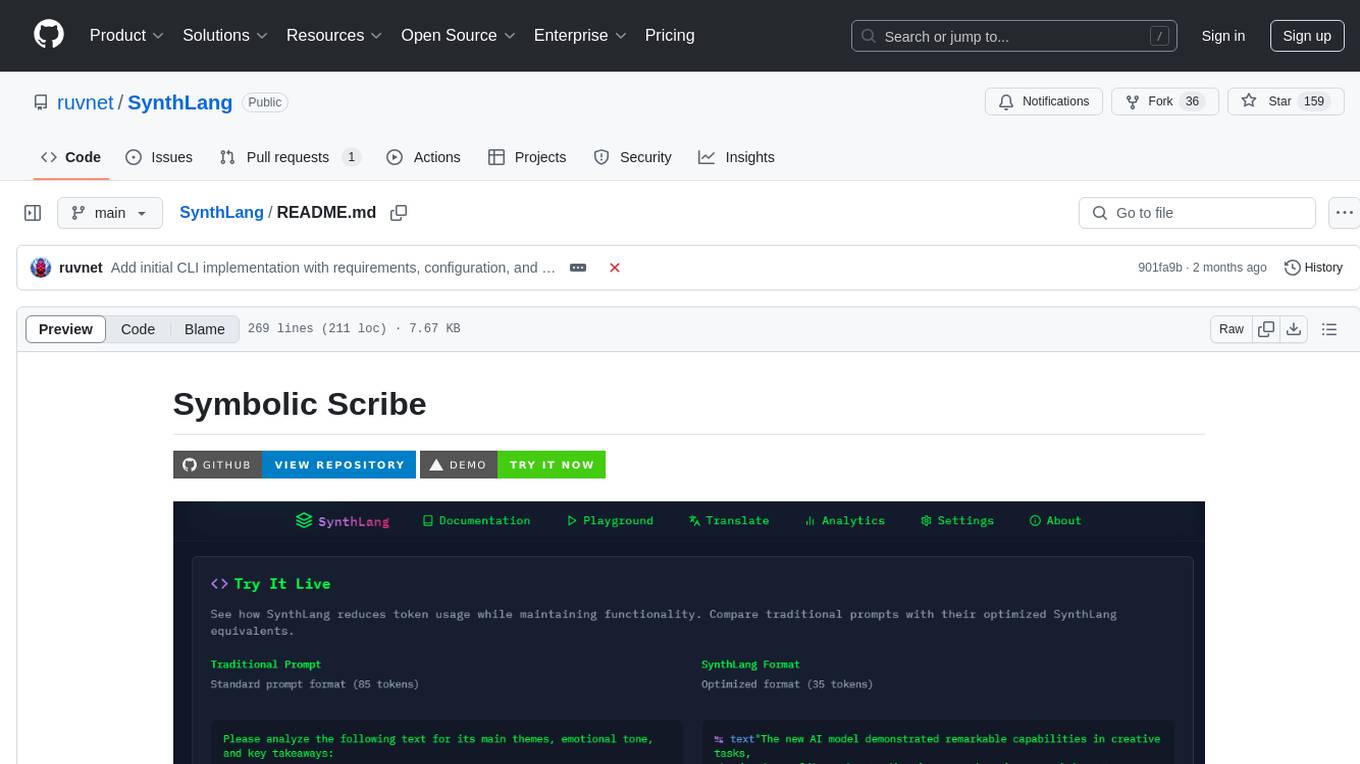
SynthLang
SynthLang is a tool designed to optimize AI prompts by reducing costs and improving processing speed. It brings academic rigor to prompt engineering, creating precise and powerful AI interactions. The tool includes core components like a Translator Engine, Performance Optimization, Testing Framework, and Technical Architecture. It offers mathematical precision, academic rigor, enhanced security, a modern interface, and instant testing. Users can integrate mathematical frameworks, model complex relationships, and apply structured prompts to various domains. Security features include API key management and data privacy. The tool also provides a CLI for prompt engineering and optimization capabilities.
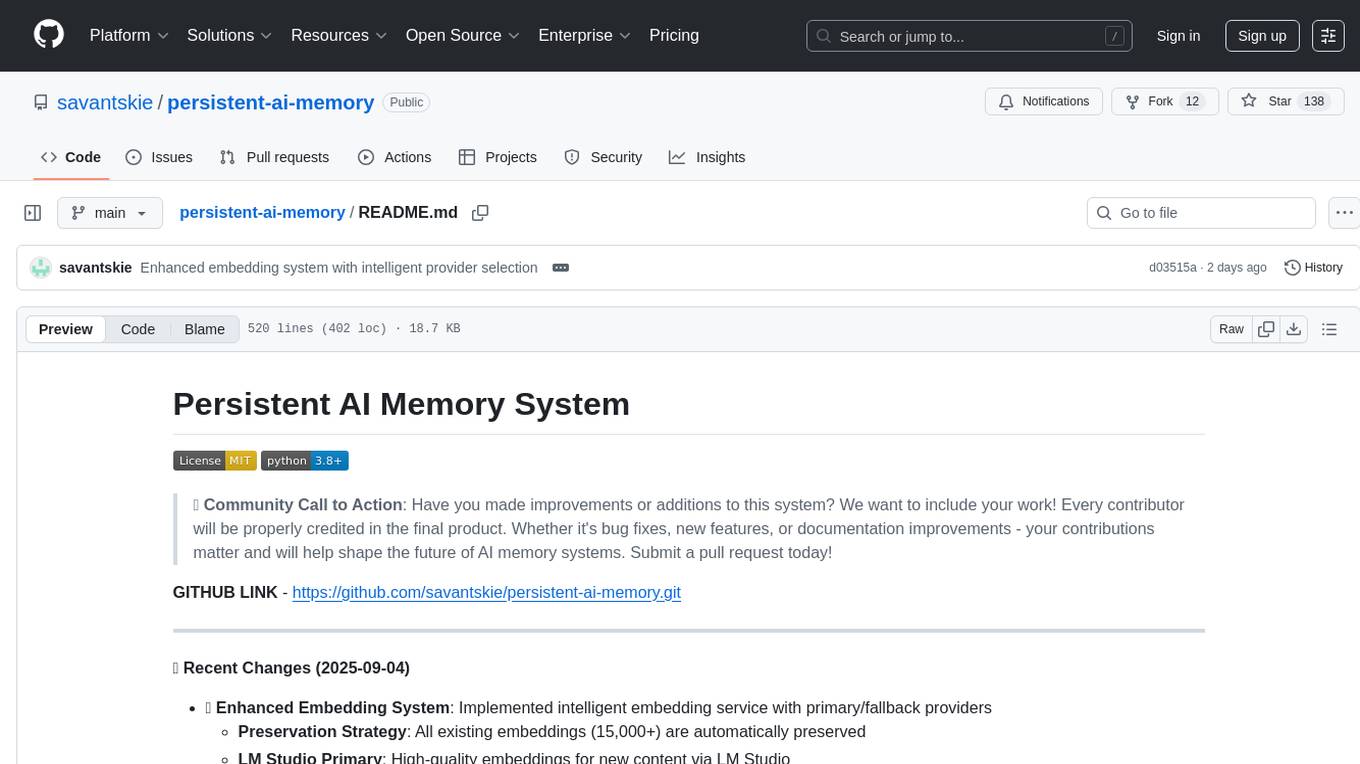
persistent-ai-memory
Persistent AI Memory System is a comprehensive tool that offers persistent, searchable storage for AI assistants. It includes features like conversation tracking, MCP tool call logging, and intelligent scheduling. The system supports multiple databases, provides enhanced memory management, and offers various tools for memory operations, schedule management, and system health checks. It also integrates with various platforms like LM Studio, VS Code, Koboldcpp, Ollama, and more. The system is designed to be modular, platform-agnostic, and scalable, allowing users to handle large conversation histories efficiently.
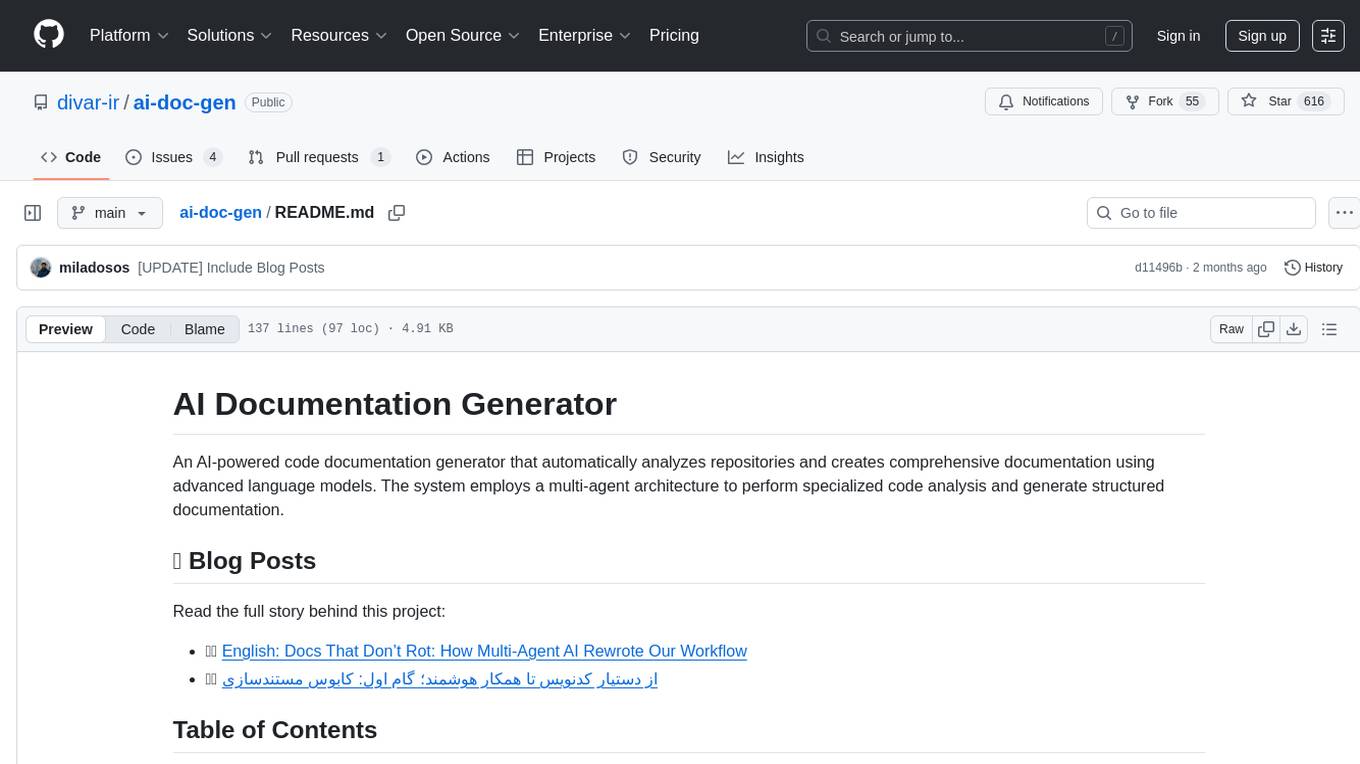
ai-doc-gen
An AI-powered code documentation generator that automatically analyzes repositories and creates comprehensive documentation using advanced language models. The system employs a multi-agent architecture to perform specialized code analysis and generate structured documentation.
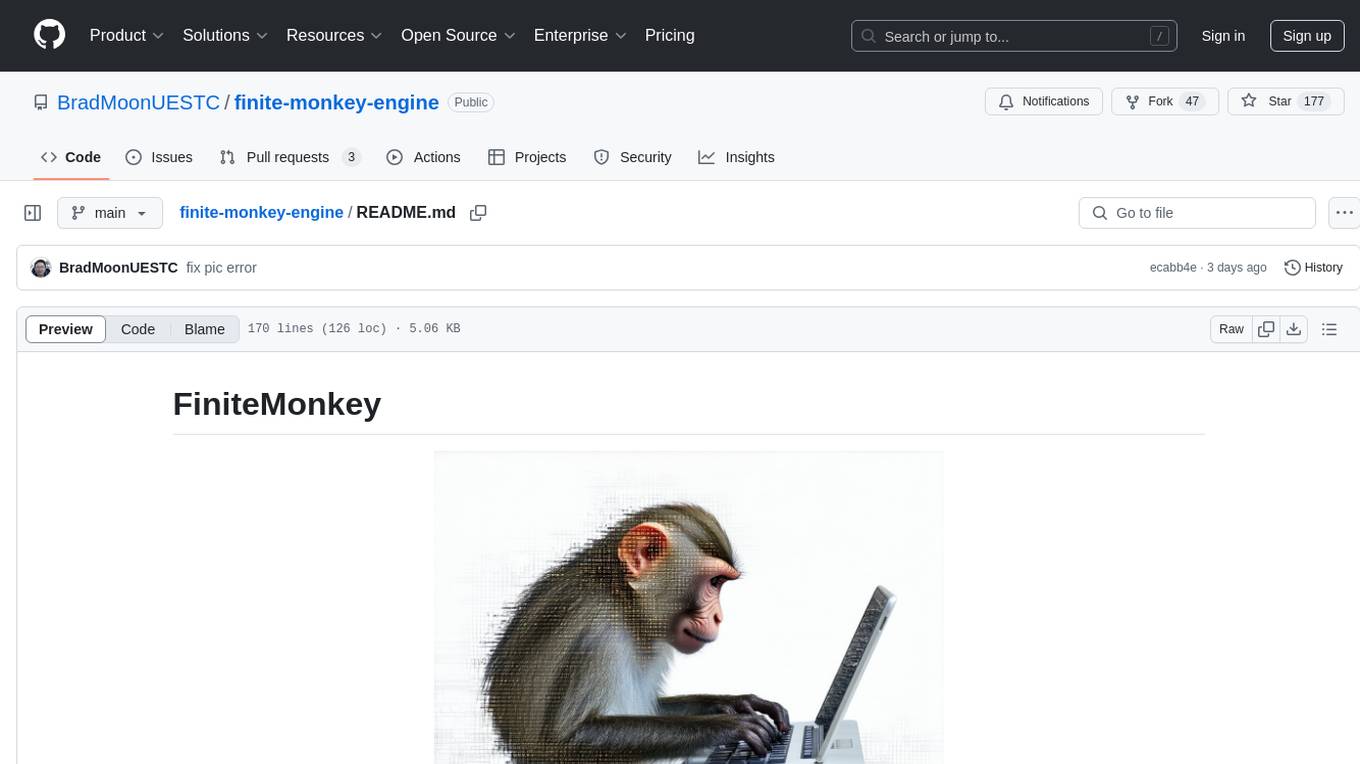
finite-monkey-engine
FiniteMonkey is an advanced vulnerability mining engine powered purely by GPT, requiring no prior knowledge base or fine-tuning. Its effectiveness significantly surpasses most current related research approaches. The tool is task-driven, prompt-driven, and focuses on prompt design, leveraging 'deception' and hallucination as key mechanics. It has helped identify vulnerabilities worth over $60,000 in bounties. The tool requires PostgreSQL database, OpenAI API access, and Python environment for setup. It supports various languages like Solidity, Rust, Python, Move, Cairo, Tact, Func, Java, and Fake Solidity for scanning. FiniteMonkey is best suited for logic vulnerability mining in real projects, not recommended for academic vulnerability testing. GPT-4-turbo is recommended for optimal results with an average scan time of 2-3 hours for medium projects. The tool provides detailed scanning results guide and implementation tips for users.
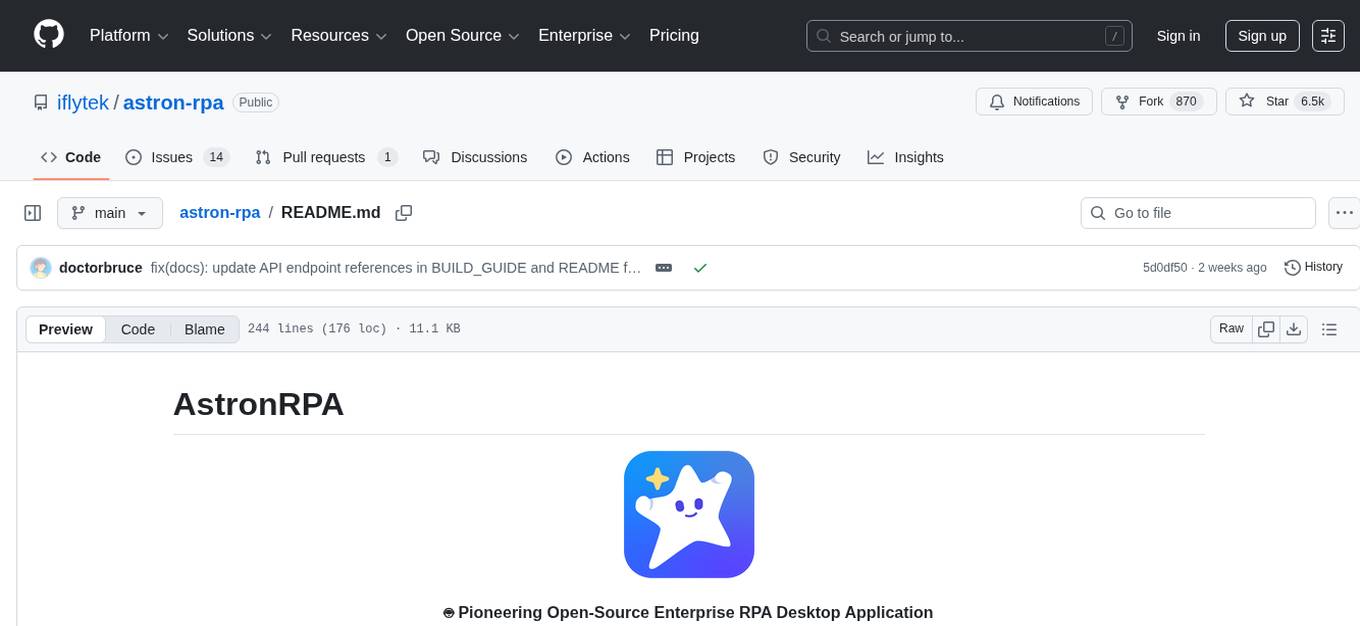
astron-rpa
AstronRPA is an enterprise-grade Robotic Process Automation (RPA) desktop application that supports low-code/no-code development. It enables users to rapidly build workflows and automate desktop software and web pages. The tool offers comprehensive automation support for various applications, highly component-based design, enterprise-grade security and collaboration features, developer-friendly experience, native agent empowerment, and multi-channel trigger integration. It follows a frontend-backend separation architecture with components for system operations, browser automation, GUI automation, AI integration, and more. The tool is deployed via Docker and designed for complex RPA scenarios.
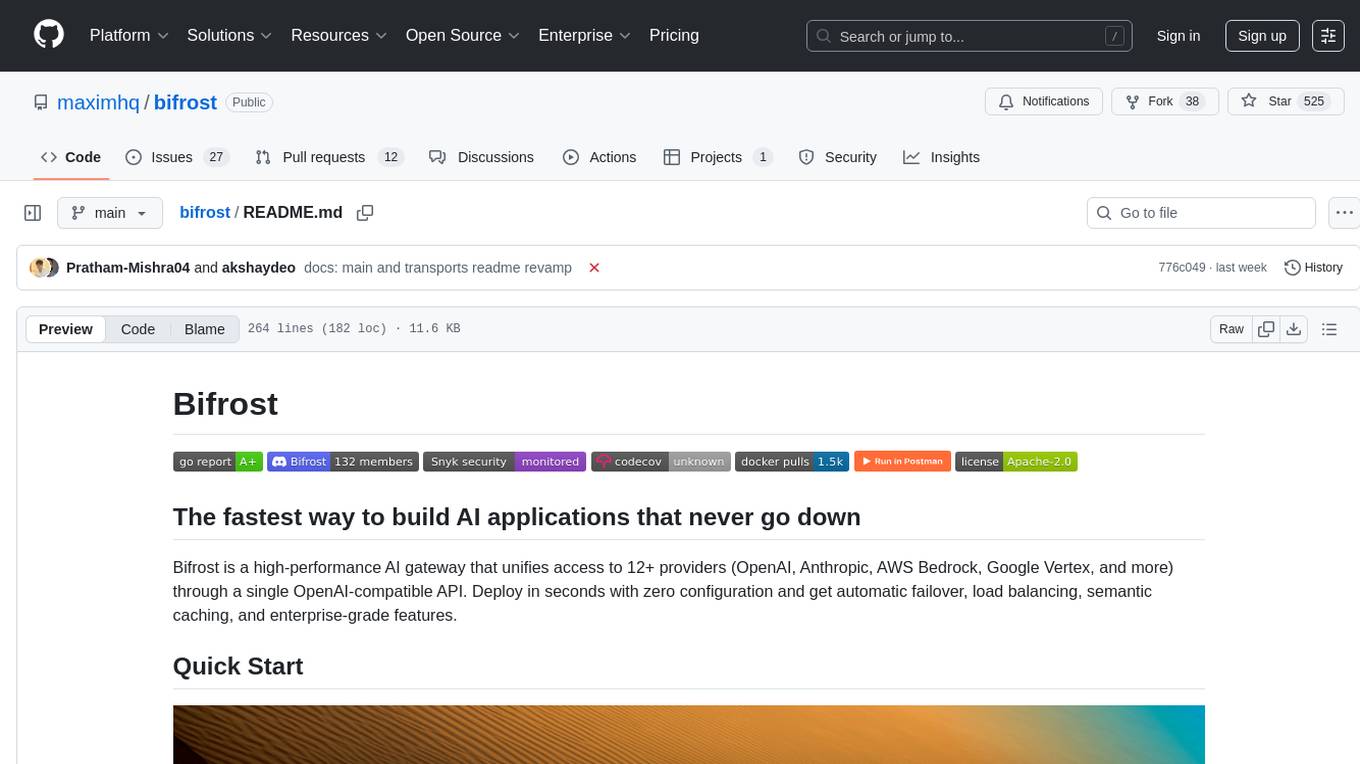
bifrost
Bifrost is a high-performance AI gateway that unifies access to multiple providers through a single OpenAI-compatible API. It offers features like automatic failover, load balancing, semantic caching, and enterprise-grade functionalities. Users can deploy Bifrost in seconds with zero configuration, benefiting from its core infrastructure, advanced features, enterprise and security capabilities, and developer experience. The repository structure is modular, allowing for maximum flexibility. Bifrost is designed for quick setup, easy configuration, and seamless integration with various AI models and tools.
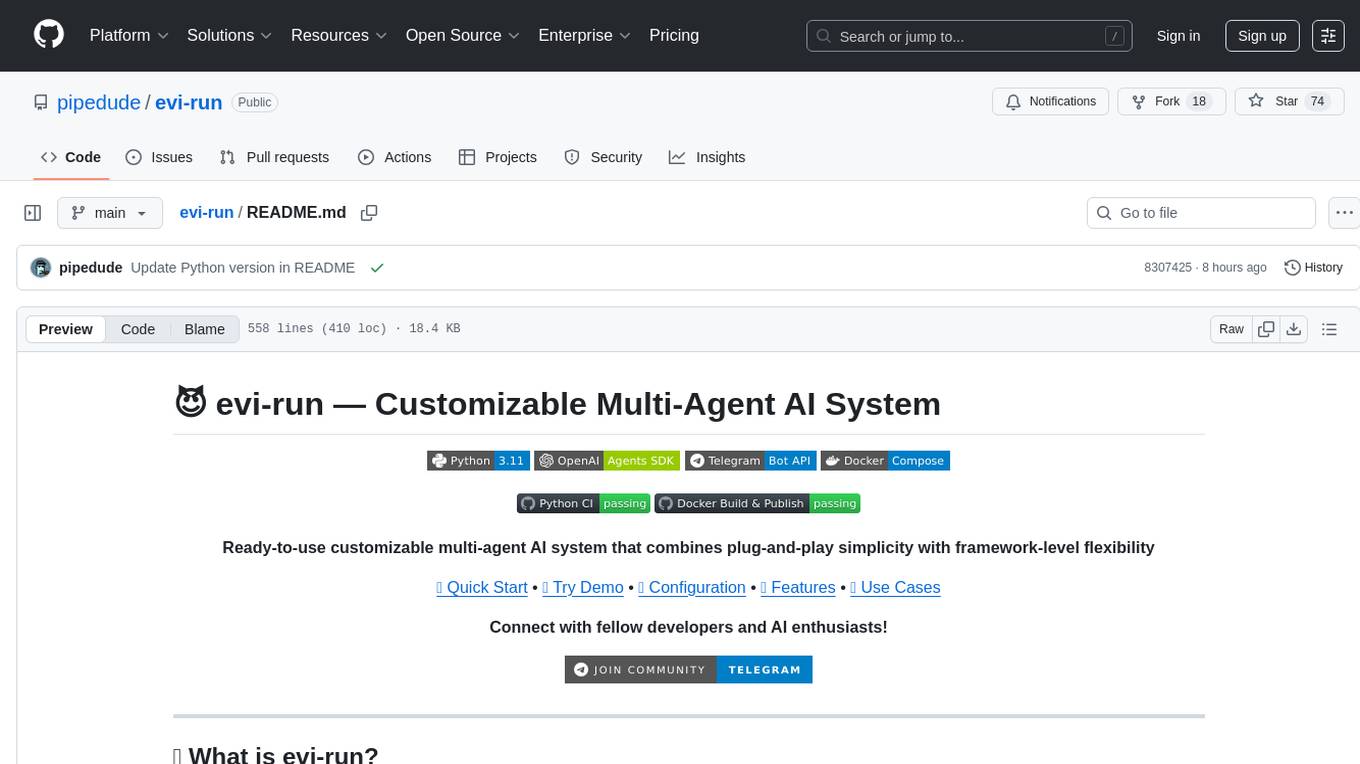
evi-run
evi-run is a powerful, production-ready multi-agent AI system built on Python using the OpenAI Agents SDK. It offers instant deployment, ultimate flexibility, built-in analytics, Telegram integration, and scalable architecture. The system features memory management, knowledge integration, task scheduling, multi-agent orchestration, custom agent creation, deep research, web intelligence, document processing, image generation, DEX analytics, and Solana token swap. It supports flexible usage modes like private, free, and pay mode, with upcoming features including NSFW mode, task scheduler, and automatic limit orders. The technology stack includes Python 3.11, OpenAI Agents SDK, Telegram Bot API, PostgreSQL, Redis, and Docker & Docker Compose for deployment.
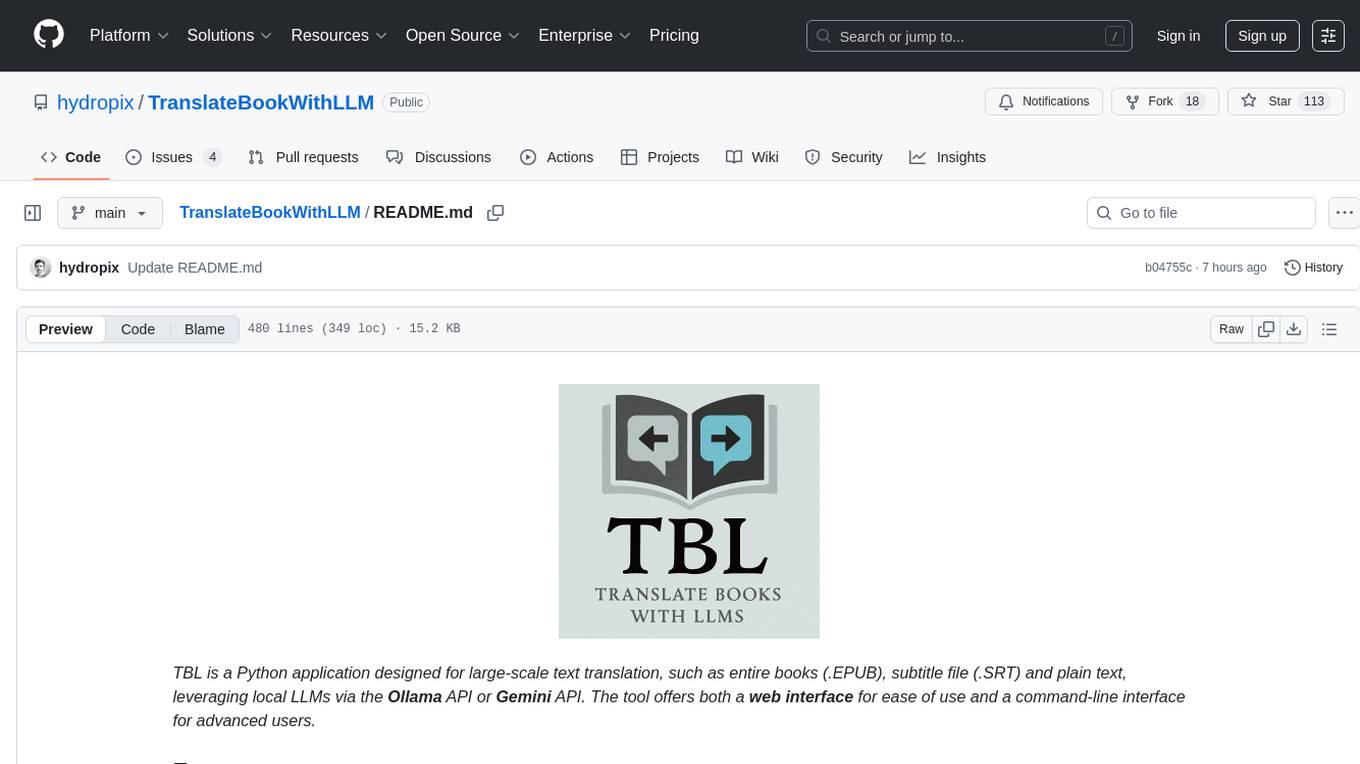
TranslateBookWithLLM
TranslateBookWithLLM is a Python application designed for large-scale text translation, such as entire books (.EPUB), subtitle files (.SRT), and plain text. It leverages local LLMs via the Ollama API or Gemini API. The tool offers both a web interface for ease of use and a command-line interface for advanced users. It supports multiple format translations, provides a user-friendly browser-based interface, CLI support for automation, multiple LLM providers including local Ollama models and Google Gemini API, and Docker support for easy deployment.
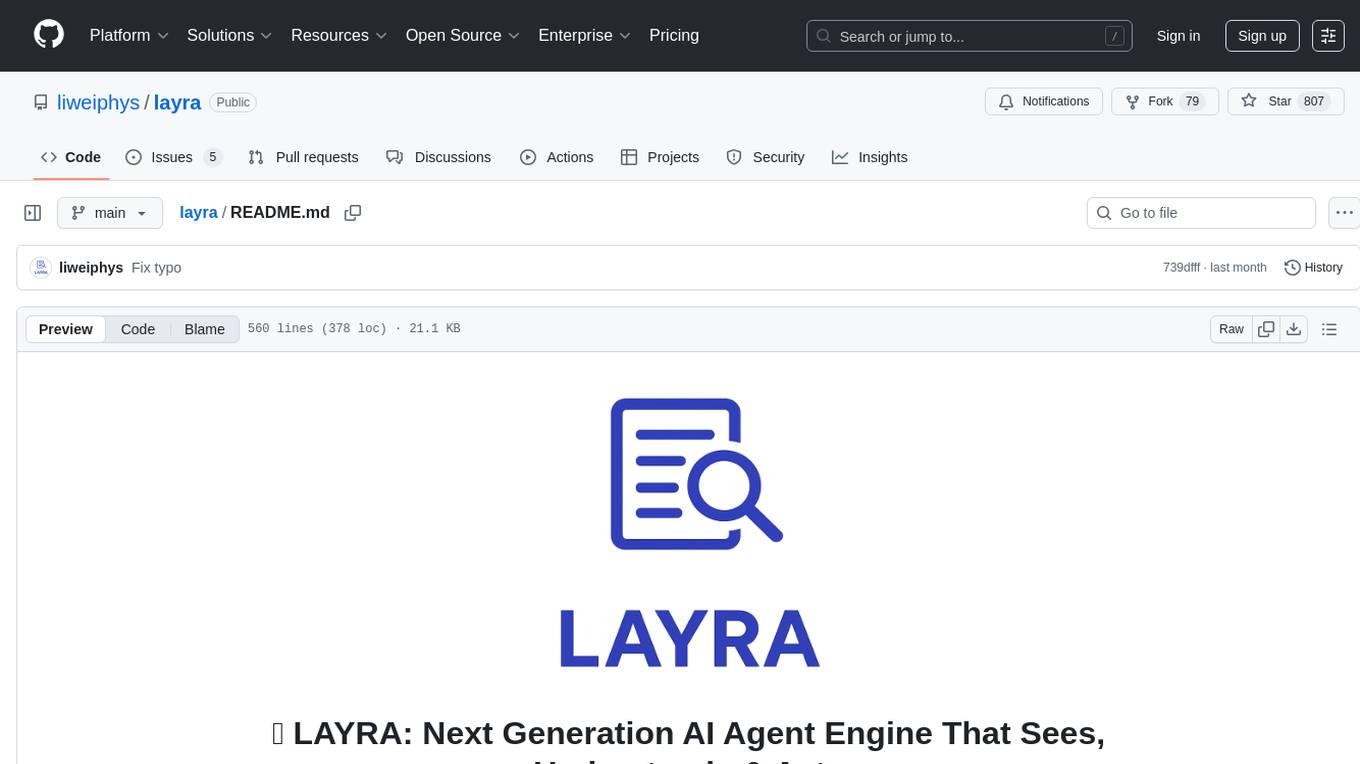
layra
LAYRA is the world's first visual-native AI automation engine that sees documents like a human, preserves layout and graphical elements, and executes arbitrarily complex workflows with full Python control. It empowers users to build next-generation intelligent systems with no limits or compromises. Built for Enterprise-Grade deployment, LAYRA features a modern frontend, high-performance backend, decoupled service architecture, visual-native multimodal document understanding, and a powerful workflow engine.
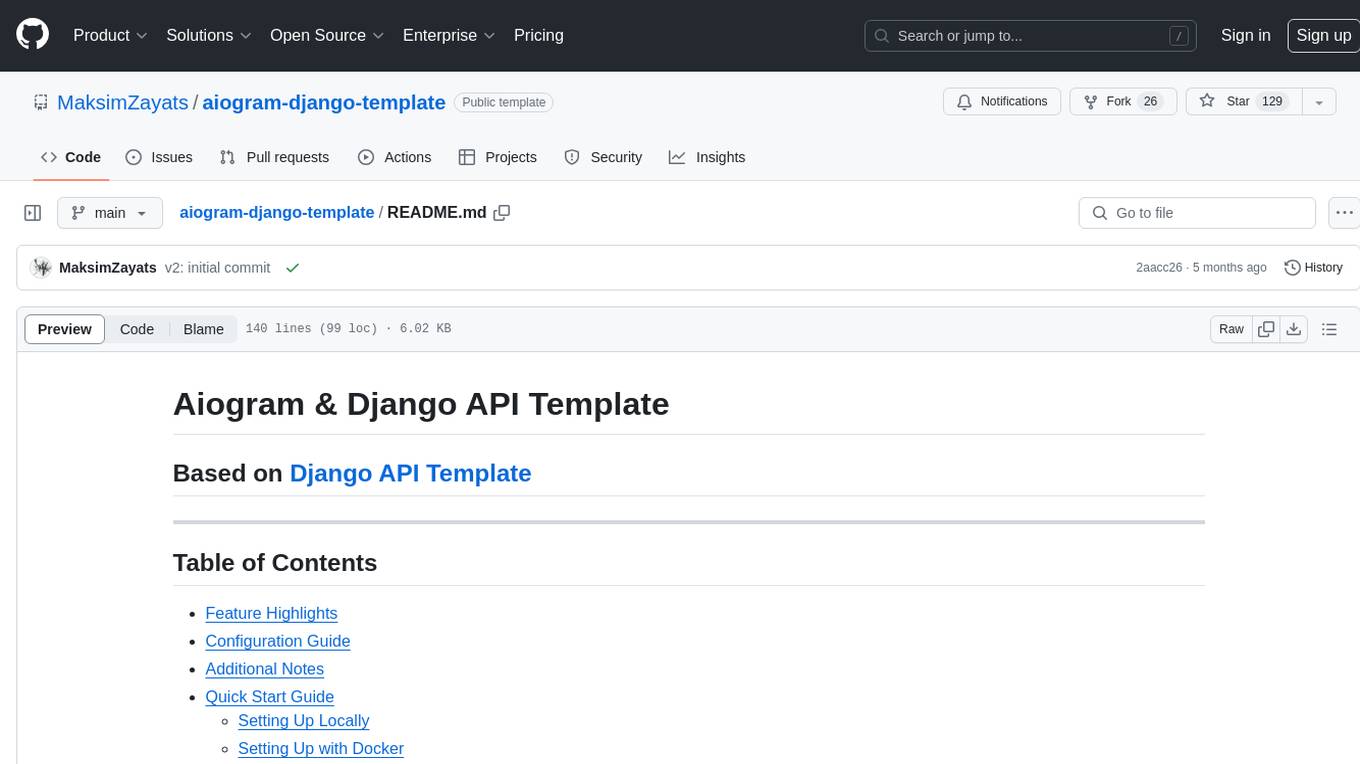
aiogram-django-template
Aiogram & Django API Template is a robust and secure Django template with advanced features like Docker integration, Celery for asynchronous tasks, Sentry for error tracking, Django Rest Framework for building APIs, and more. It provides scalability options, up-to-date dependencies, and integration with AWS S3 for storage. The template includes configuration guides for secrets, ports, performance tuning, application settings, CORS and CSRF settings, and database configuration. Security, scalability, and monitoring are emphasized for efficient Django API development.
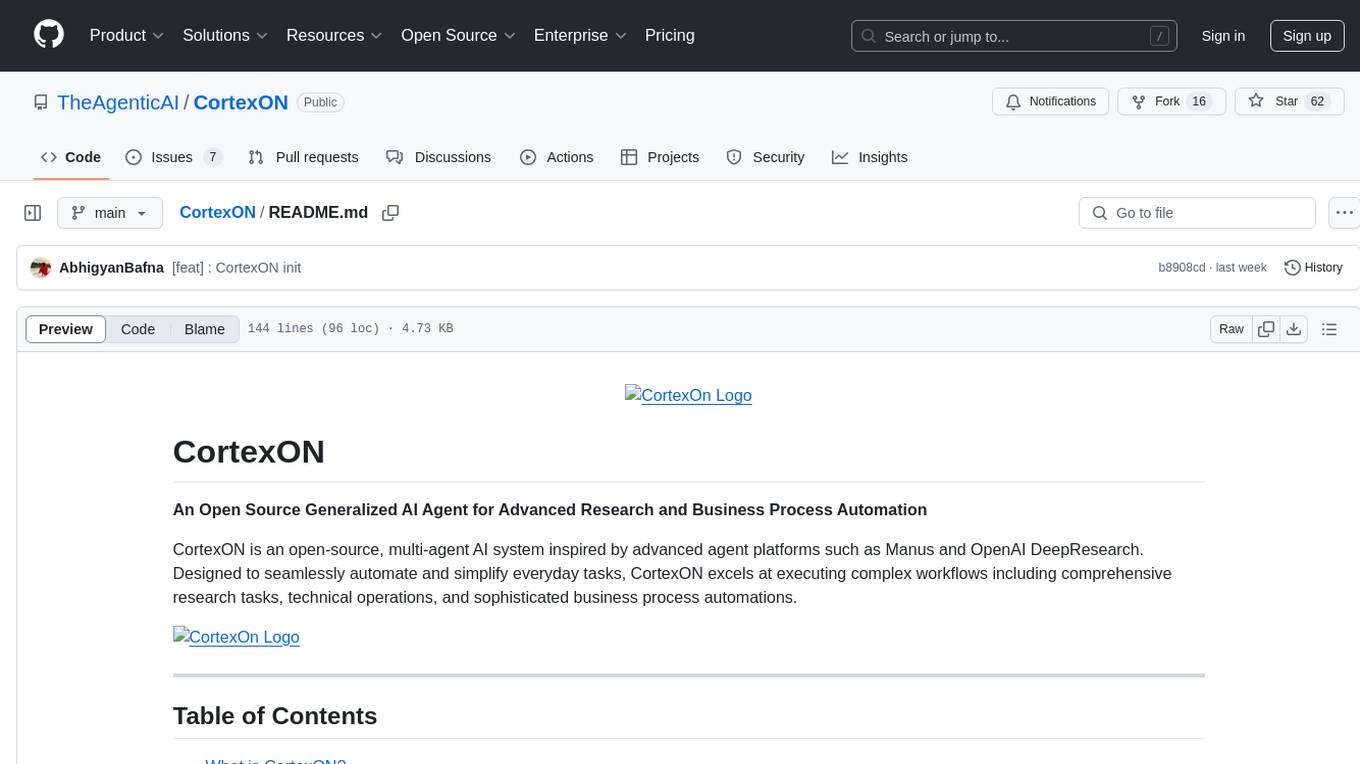
CortexON
CortexON is an open-source, multi-agent AI system designed to automate and simplify everyday tasks. It integrates specialized agents like Web Agent, File Agent, Coder Agent, Executor Agent, and API Agent to accomplish user-defined objectives. CortexON excels at executing complex workflows, research tasks, technical operations, and business process automations by dynamically coordinating the agents' unique capabilities. It offers advanced research automation, multi-agent orchestration, integration with third-party APIs, code generation and execution, efficient file and data management, and personalized task execution for travel planning, market analysis, educational content creation, and business intelligence.
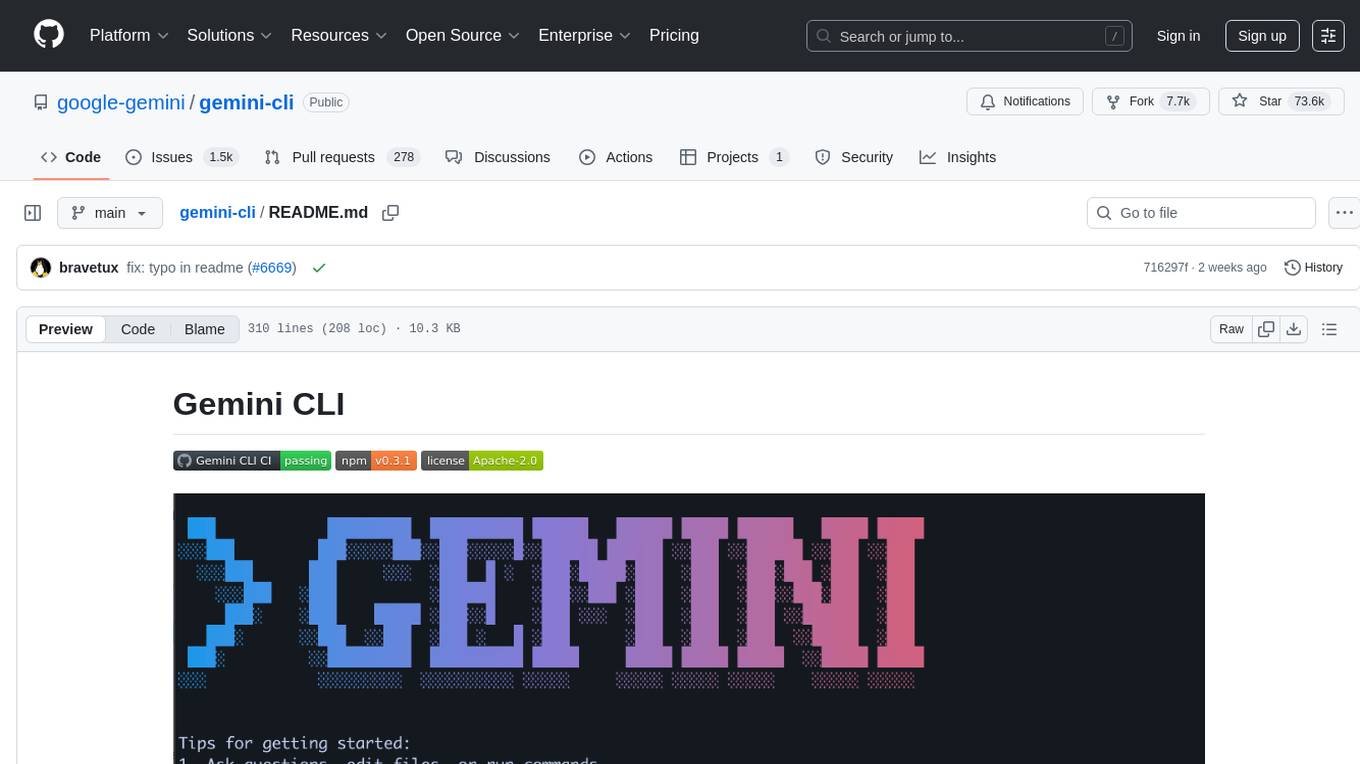
gemini-cli
Gemini CLI is an open-source AI agent that provides lightweight access to Gemini, offering powerful capabilities like code understanding, generation, automation, integration, and advanced features. It is designed for developers who prefer working in the command line and offers extensibility through MCP support. The tool integrates directly into GitHub workflows and offers various authentication options for individual developers, enterprise teams, and production workloads. With features like code querying, editing, app generation, debugging, and GitHub integration, Gemini CLI aims to streamline development workflows and enhance productivity.
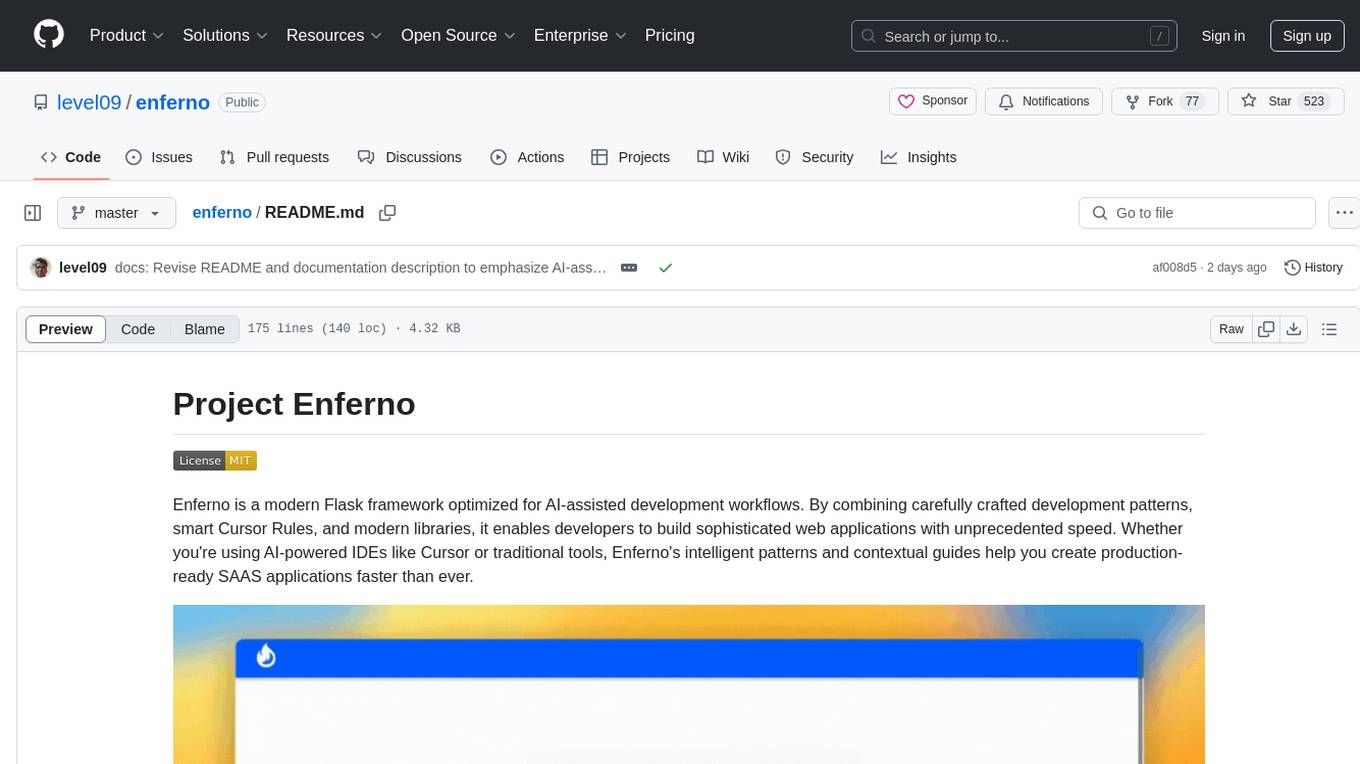
enferno
Enferno is a modern Flask framework optimized for AI-assisted development workflows. It combines carefully crafted development patterns, smart Cursor Rules, and modern libraries to enable developers to build sophisticated web applications with unprecedented speed. Enferno's intelligent patterns and contextual guides help create production-ready SAAS applications faster than ever. It includes features like modern stack, authentication, OAuth integration, database support, task queue, frontend components, security measures, Docker readiness, and more.
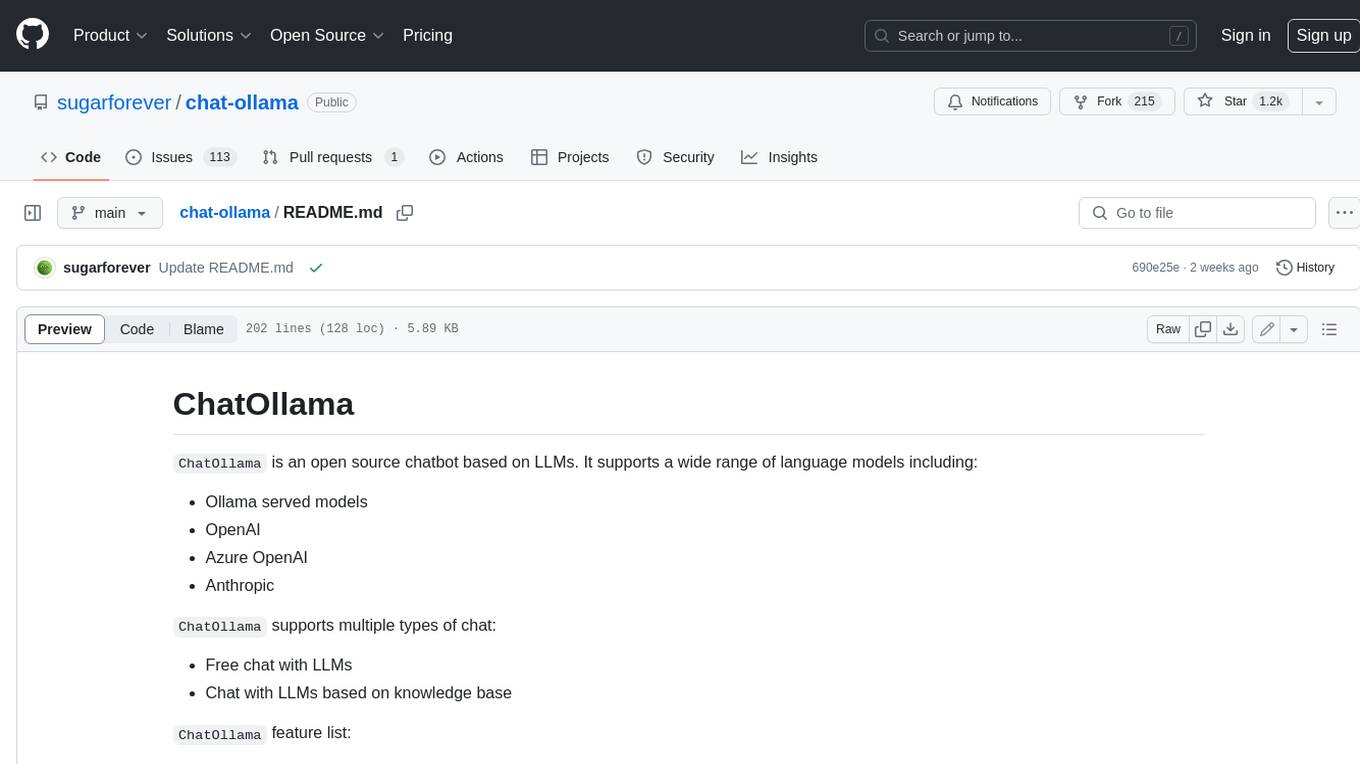
chat-ollama
ChatOllama is an open-source chatbot based on LLMs (Large Language Models). It supports a wide range of language models, including Ollama served models, OpenAI, Azure OpenAI, and Anthropic. ChatOllama supports multiple types of chat, including free chat with LLMs and chat with LLMs based on a knowledge base. Key features of ChatOllama include Ollama models management, knowledge bases management, chat, and commercial LLMs API keys management.
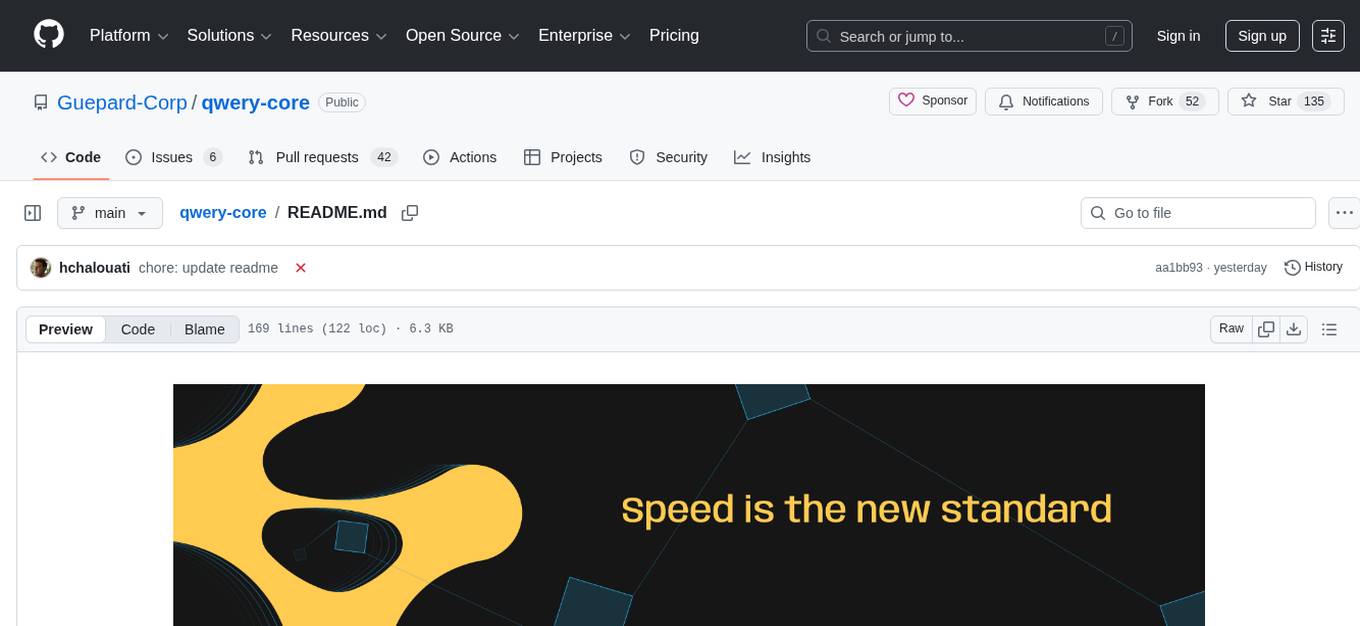
qwery-core
Qwery is a platform for querying and visualizing data using natural language without technical knowledge. It seamlessly integrates with various datasources, generates optimized queries, and delivers outcomes like result sets, dashboards, and APIs. Features include natural language querying, multi-database support, AI-powered agents, visual data apps, desktop & cloud options, template library, and extensibility through plugins. The project is under active development and not yet suitable for production use.
For similar tasks
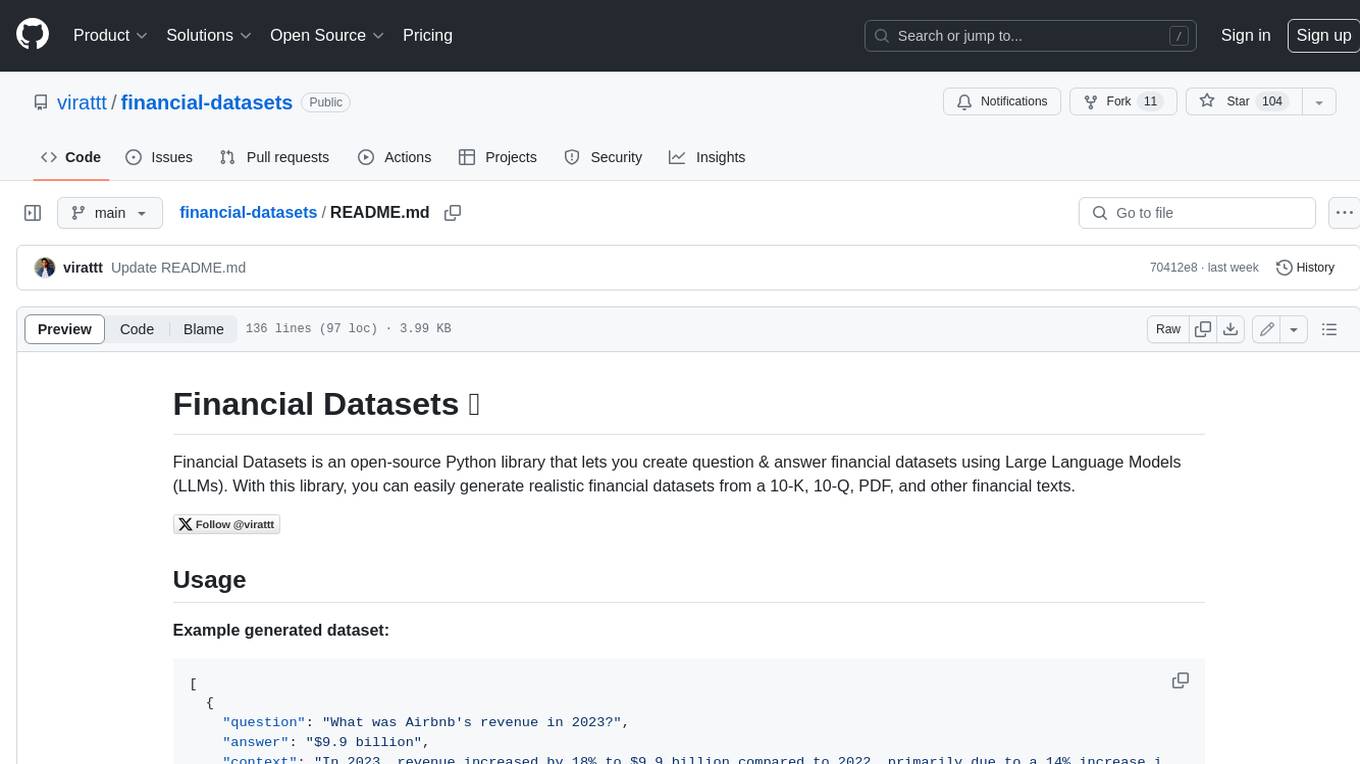
financial-datasets
Financial Datasets is an open-source Python library that allows users to create question and answer financial datasets using Large Language Models (LLMs). With this library, users can easily generate realistic financial datasets from 10-K, 10-Q, PDF, and other financial texts. The library provides three main methods for generating datasets: from any text, from a 10-K filing, or from a PDF URL. Financial Datasets can be used for a variety of tasks, including financial analysis, research, and education.
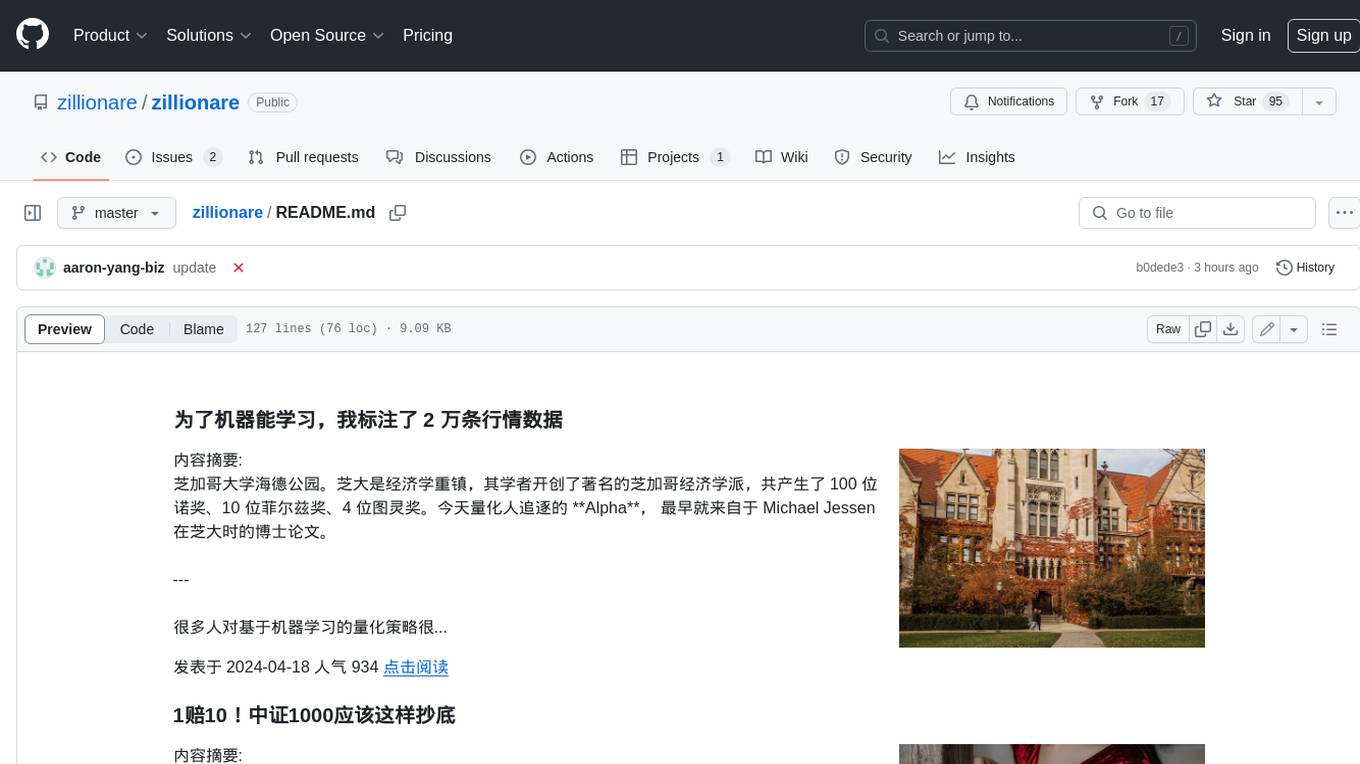
zillionare
This repository contains a collection of articles and tutorials on quantitative finance, including topics such as machine learning, statistical arbitrage, and risk management. The articles are written in a clear and concise style, and they are suitable for both beginners and experienced practitioners. The repository also includes a number of Jupyter notebooks that demonstrate how to use Python for quantitative finance.
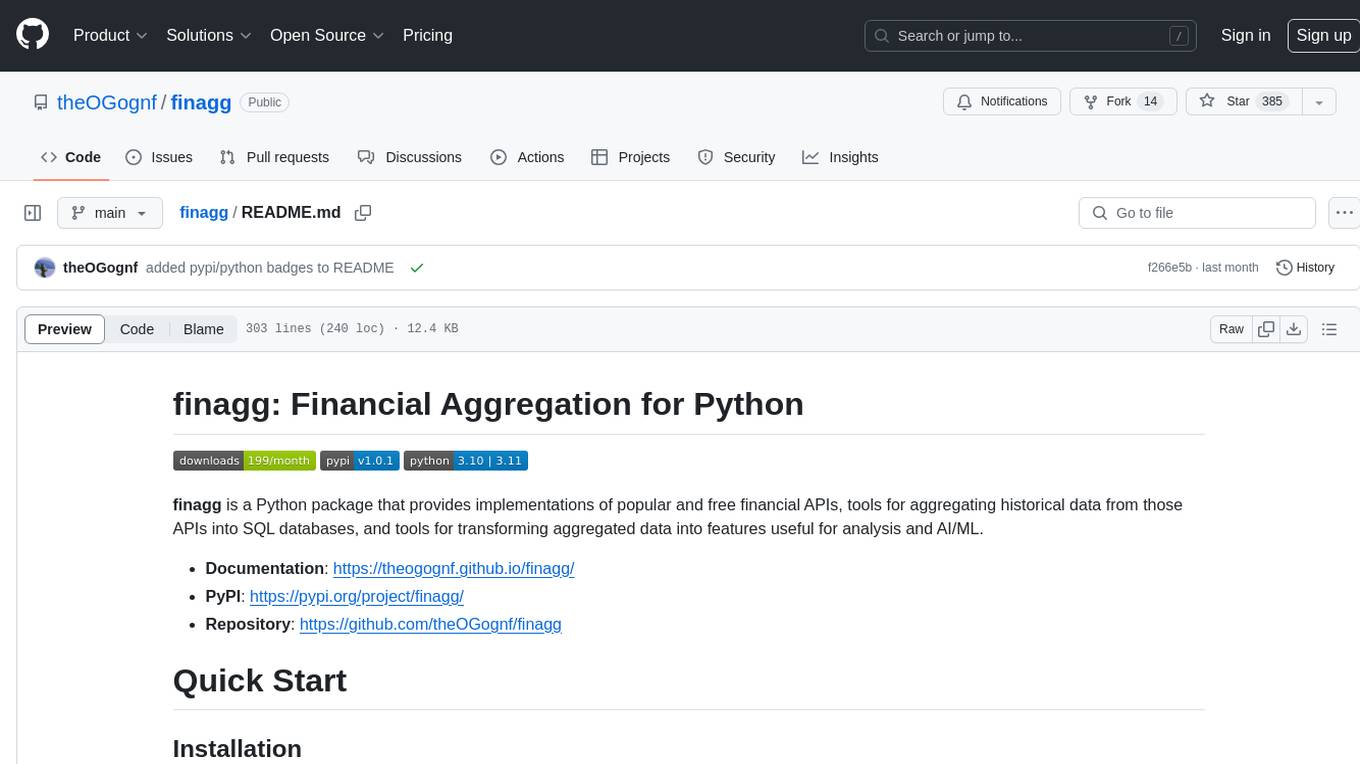
finagg
finagg is a Python package that provides implementations of popular and free financial APIs, tools for aggregating historical data from those APIs into SQL databases, and tools for transforming aggregated data into features useful for analysis and AI/ML. It offers documentation, installation instructions, and basic usage examples for exploring various financial APIs and features. Users can install recommended datasets from 3rd party APIs into a local SQL database, access Bureau of Economic Analysis (BEA) data, Federal Reserve Economic Data (FRED), Securities and Exchange Commission (SEC) filings, and more. The package also allows users to explore raw data features, install refined data features, and perform refined aggregations of raw data. Configuration options for API keys, user agents, and data locations are provided, along with information on dependencies and related projects.

lyraios
LYRAIOS (LLM-based Your Reliable AI Operating System) is an advanced AI assistant platform built with FastAPI and Streamlit, designed to serve as an operating system for AI applications. It offers core features such as AI process management, memory system, and I/O system. The platform includes built-in tools like Calculator, Web Search, Financial Analysis, File Management, and Research Tools. It also provides specialized assistant teams for Python and research tasks. LYRAIOS is built on a technical architecture comprising FastAPI backend, Streamlit frontend, Vector Database, PostgreSQL storage, and Docker support. It offers features like knowledge management, process control, and security & access control. The roadmap includes enhancements in core platform, AI process management, memory system, tools & integrations, security & access control, open protocol architecture, multi-agent collaboration, and cross-platform support.
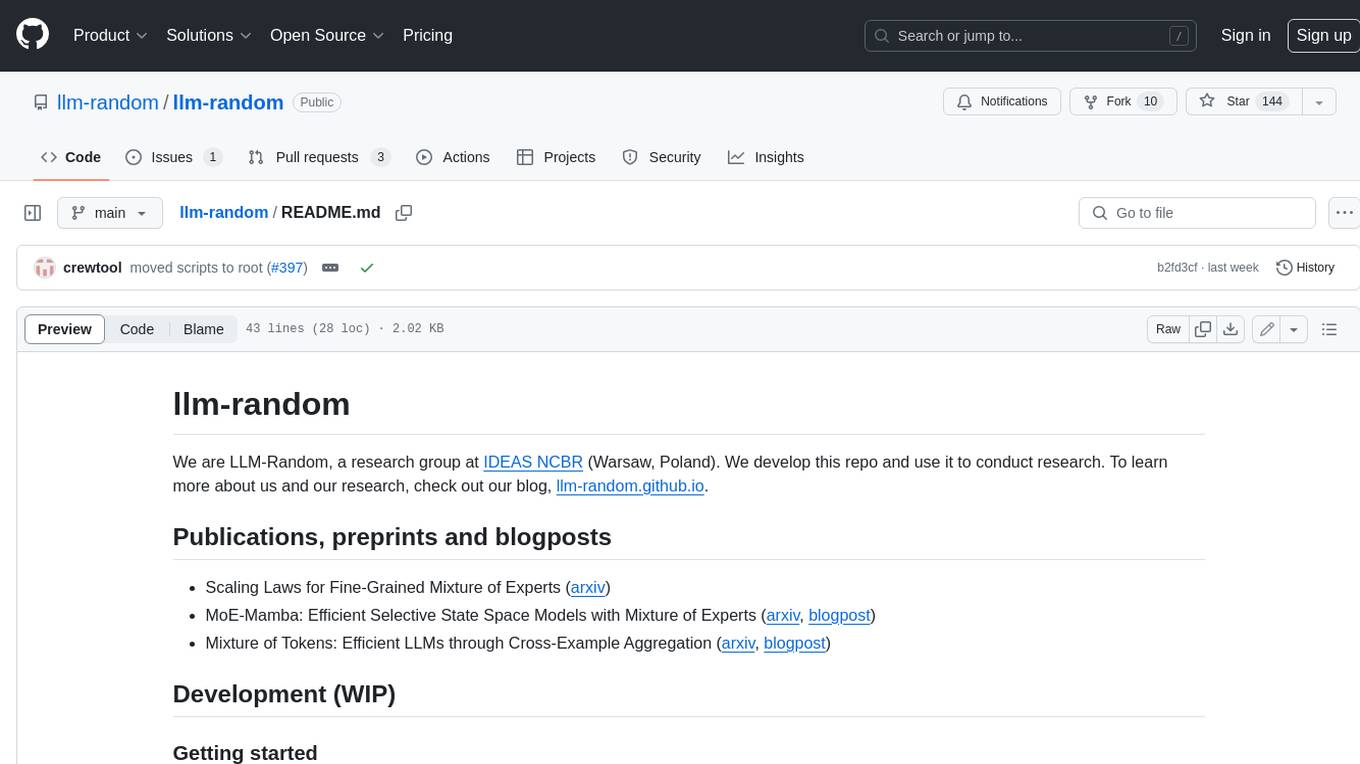
llm-random
This repository contains code for research conducted by the LLM-Random research group at IDEAS NCBR in Warsaw, Poland. The group focuses on developing and using this repository to conduct research. For more information about the group and its research, refer to their blog, llm-random.github.io.
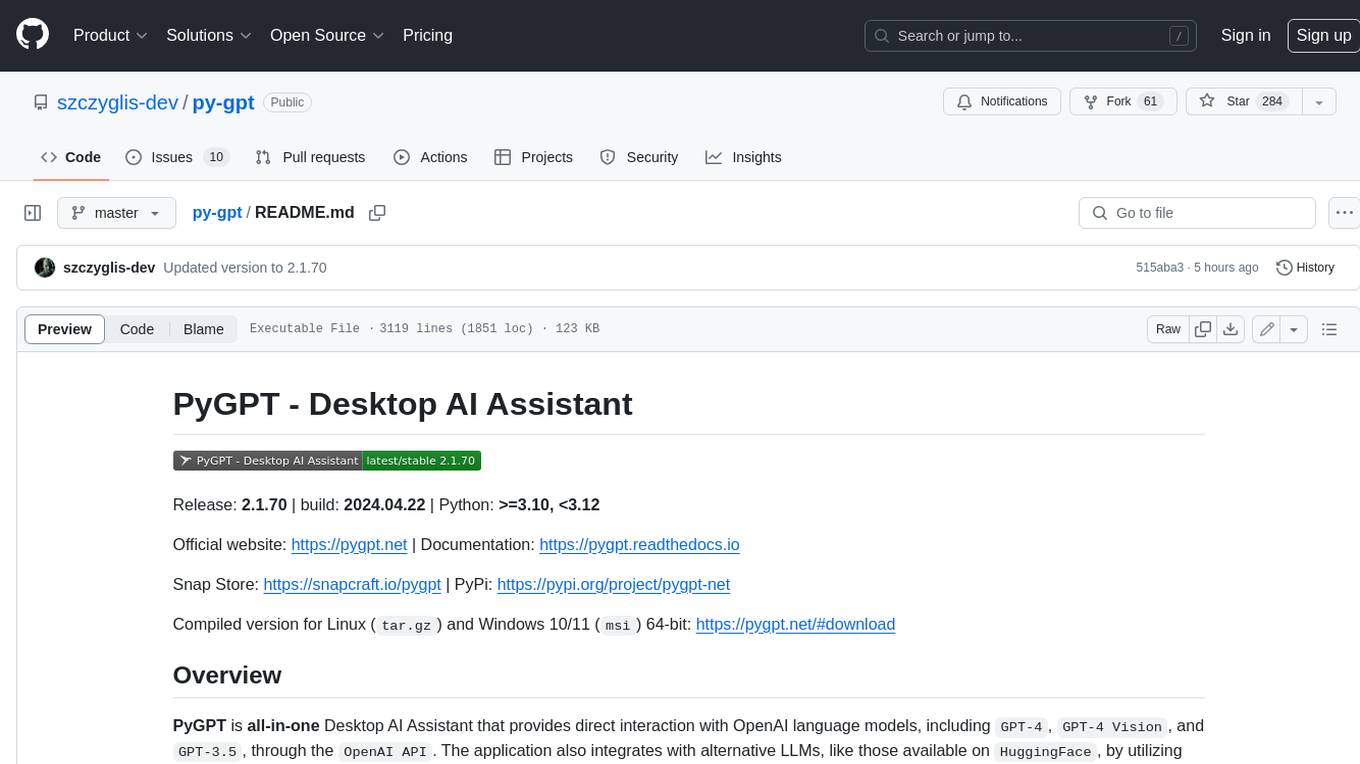
py-gpt
Py-GPT is a Python library that provides an easy-to-use interface for OpenAI's GPT-3 API. It allows users to interact with the powerful GPT-3 model for various natural language processing tasks. With Py-GPT, developers can quickly integrate GPT-3 capabilities into their applications, enabling them to generate text, answer questions, and more with just a few lines of code.
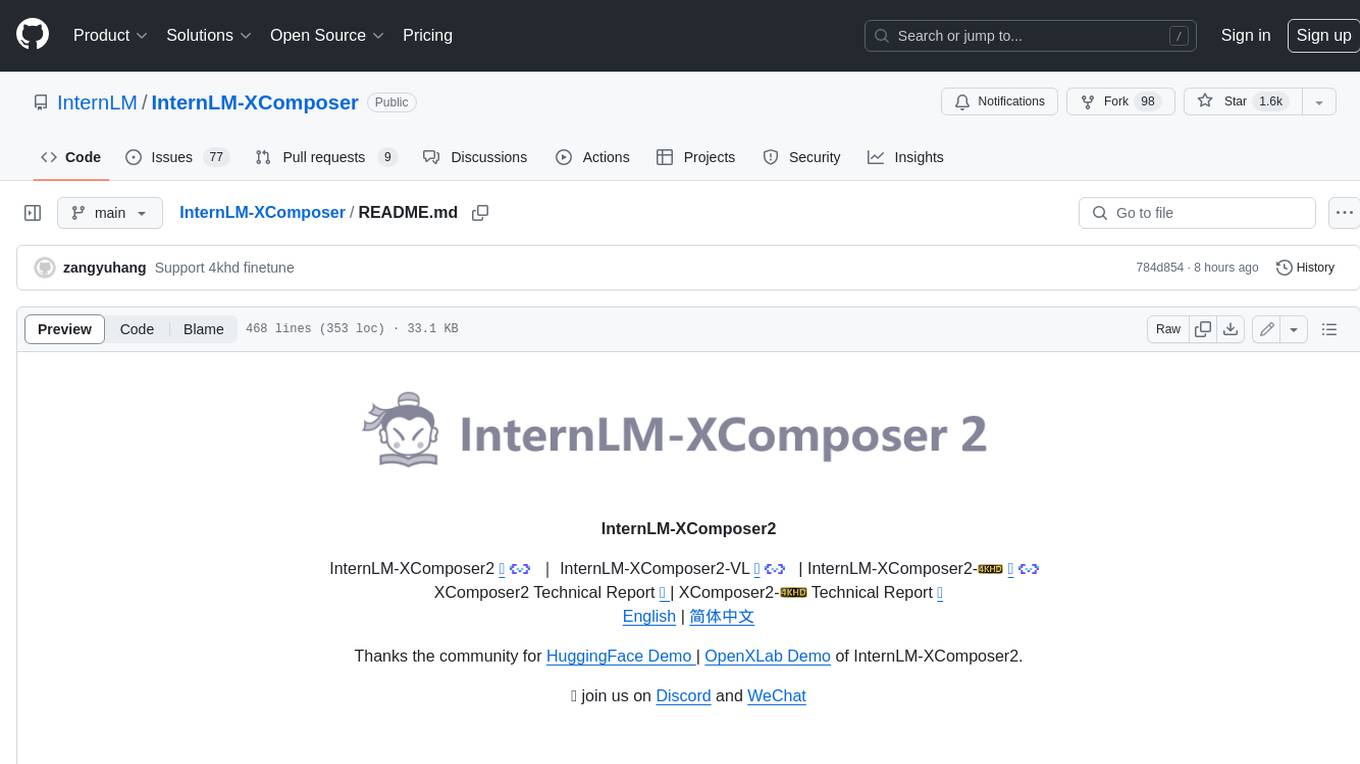
InternLM-XComposer
InternLM-XComposer2 is a groundbreaking vision-language large model (VLLM) based on InternLM2-7B excelling in free-form text-image composition and comprehension. It boasts several amazing capabilities and applications: * **Free-form Interleaved Text-Image Composition** : InternLM-XComposer2 can effortlessly generate coherent and contextual articles with interleaved images following diverse inputs like outlines, detailed text requirements and reference images, enabling highly customizable content creation. * **Accurate Vision-language Problem-solving** : InternLM-XComposer2 accurately handles diverse and challenging vision-language Q&A tasks based on free-form instructions, excelling in recognition, perception, detailed captioning, visual reasoning, and more. * **Awesome performance** : InternLM-XComposer2 based on InternLM2-7B not only significantly outperforms existing open-source multimodal models in 13 benchmarks but also **matches or even surpasses GPT-4V and Gemini Pro in 6 benchmarks** We release InternLM-XComposer2 series in three versions: * **InternLM-XComposer2-4KHD-7B** 🤗: The high-resolution multi-task trained VLLM model with InternLM-7B as the initialization of the LLM for _High-resolution understanding_ , _VL benchmarks_ and _AI assistant_. * **InternLM-XComposer2-VL-7B** 🤗 : The multi-task trained VLLM model with InternLM-7B as the initialization of the LLM for _VL benchmarks_ and _AI assistant_. **It ranks as the most powerful vision-language model based on 7B-parameter level LLMs, leading across 13 benchmarks.** * **InternLM-XComposer2-VL-1.8B** 🤗 : A lightweight version of InternLM-XComposer2-VL based on InternLM-1.8B. * **InternLM-XComposer2-7B** 🤗: The further instruction tuned VLLM for _Interleaved Text-Image Composition_ with free-form inputs. Please refer to Technical Report and 4KHD Technical Reportfor more details.
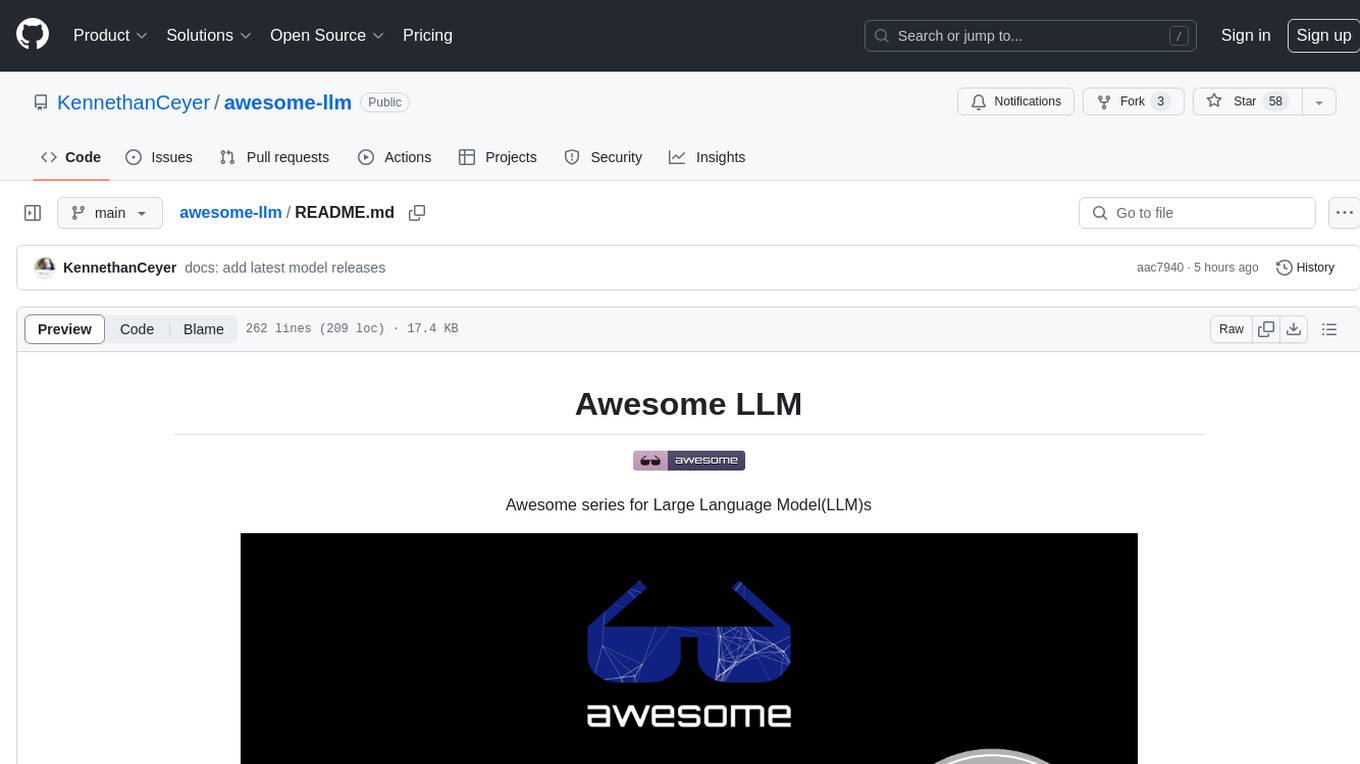
awesome-llm
Awesome LLM is a curated list of resources related to Large Language Models (LLMs), including models, projects, datasets, benchmarks, materials, papers, posts, GitHub repositories, HuggingFace repositories, and reading materials. It provides detailed information on various LLMs, their parameter sizes, announcement dates, and contributors. The repository covers a wide range of LLM-related topics and serves as a valuable resource for researchers, developers, and enthusiasts interested in the field of natural language processing and artificial intelligence.
For similar jobs

sweep
Sweep is an AI junior developer that turns bugs and feature requests into code changes. It automatically handles developer experience improvements like adding type hints and improving test coverage.

teams-ai
The Teams AI Library is a software development kit (SDK) that helps developers create bots that can interact with Teams and Microsoft 365 applications. It is built on top of the Bot Framework SDK and simplifies the process of developing bots that interact with Teams' artificial intelligence capabilities. The SDK is available for JavaScript/TypeScript, .NET, and Python.

ai-guide
This guide is dedicated to Large Language Models (LLMs) that you can run on your home computer. It assumes your PC is a lower-end, non-gaming setup.

classifai
Supercharge WordPress Content Workflows and Engagement with Artificial Intelligence. Tap into leading cloud-based services like OpenAI, Microsoft Azure AI, Google Gemini and IBM Watson to augment your WordPress-powered websites. Publish content faster while improving SEO performance and increasing audience engagement. ClassifAI integrates Artificial Intelligence and Machine Learning technologies to lighten your workload and eliminate tedious tasks, giving you more time to create original content that matters.

chatbot-ui
Chatbot UI is an open-source AI chat app that allows users to create and deploy their own AI chatbots. It is easy to use and can be customized to fit any need. Chatbot UI is perfect for businesses, developers, and anyone who wants to create a chatbot.

BricksLLM
BricksLLM is a cloud native AI gateway written in Go. Currently, it provides native support for OpenAI, Anthropic, Azure OpenAI and vLLM. BricksLLM aims to provide enterprise level infrastructure that can power any LLM production use cases. Here are some use cases for BricksLLM: * Set LLM usage limits for users on different pricing tiers * Track LLM usage on a per user and per organization basis * Block or redact requests containing PIIs * Improve LLM reliability with failovers, retries and caching * Distribute API keys with rate limits and cost limits for internal development/production use cases * Distribute API keys with rate limits and cost limits for students

uAgents
uAgents is a Python library developed by Fetch.ai that allows for the creation of autonomous AI agents. These agents can perform various tasks on a schedule or take action on various events. uAgents are easy to create and manage, and they are connected to a fast-growing network of other uAgents. They are also secure, with cryptographically secured messages and wallets.

griptape
Griptape is a modular Python framework for building AI-powered applications that securely connect to your enterprise data and APIs. It offers developers the ability to maintain control and flexibility at every step. Griptape's core components include Structures (Agents, Pipelines, and Workflows), Tasks, Tools, Memory (Conversation Memory, Task Memory, and Meta Memory), Drivers (Prompt and Embedding Drivers, Vector Store Drivers, Image Generation Drivers, Image Query Drivers, SQL Drivers, Web Scraper Drivers, and Conversation Memory Drivers), Engines (Query Engines, Extraction Engines, Summary Engines, Image Generation Engines, and Image Query Engines), and additional components (Rulesets, Loaders, Artifacts, Chunkers, and Tokenizers). Griptape enables developers to create AI-powered applications with ease and efficiency.
